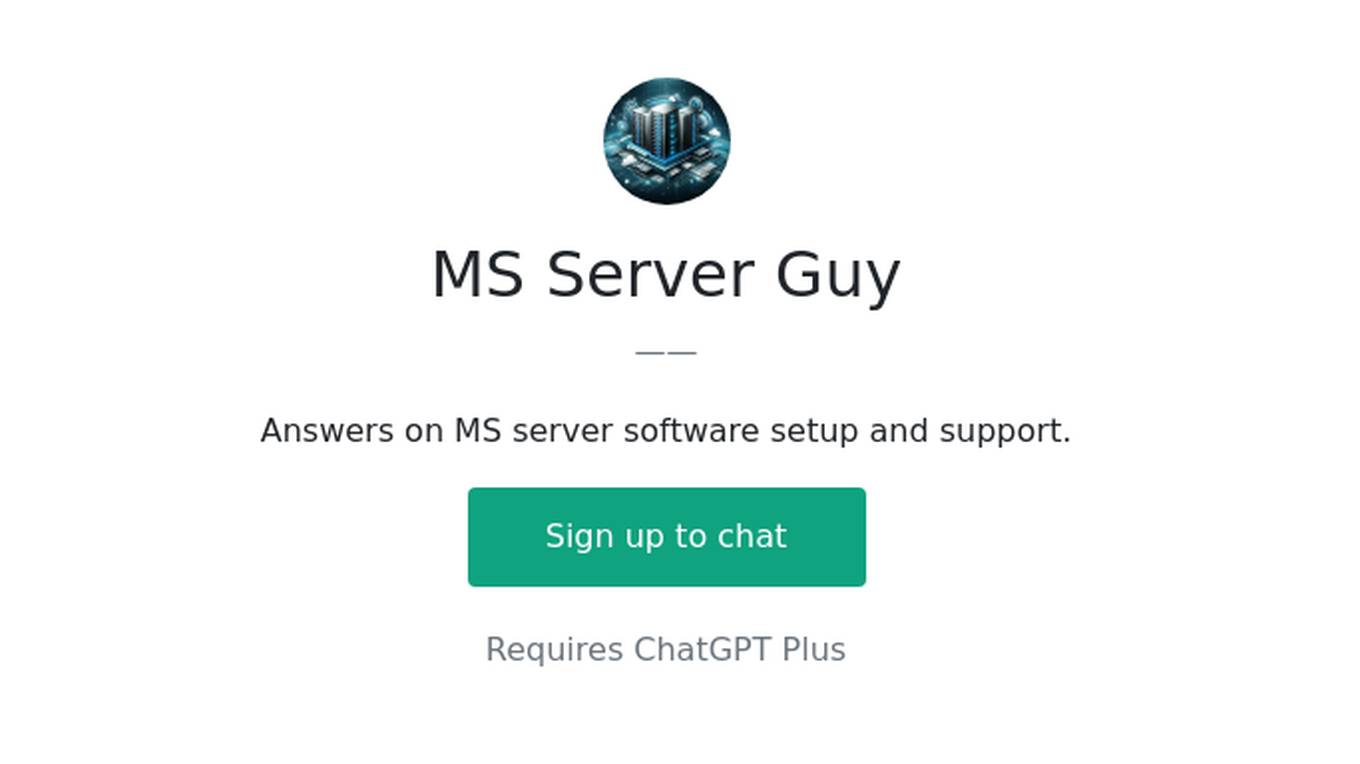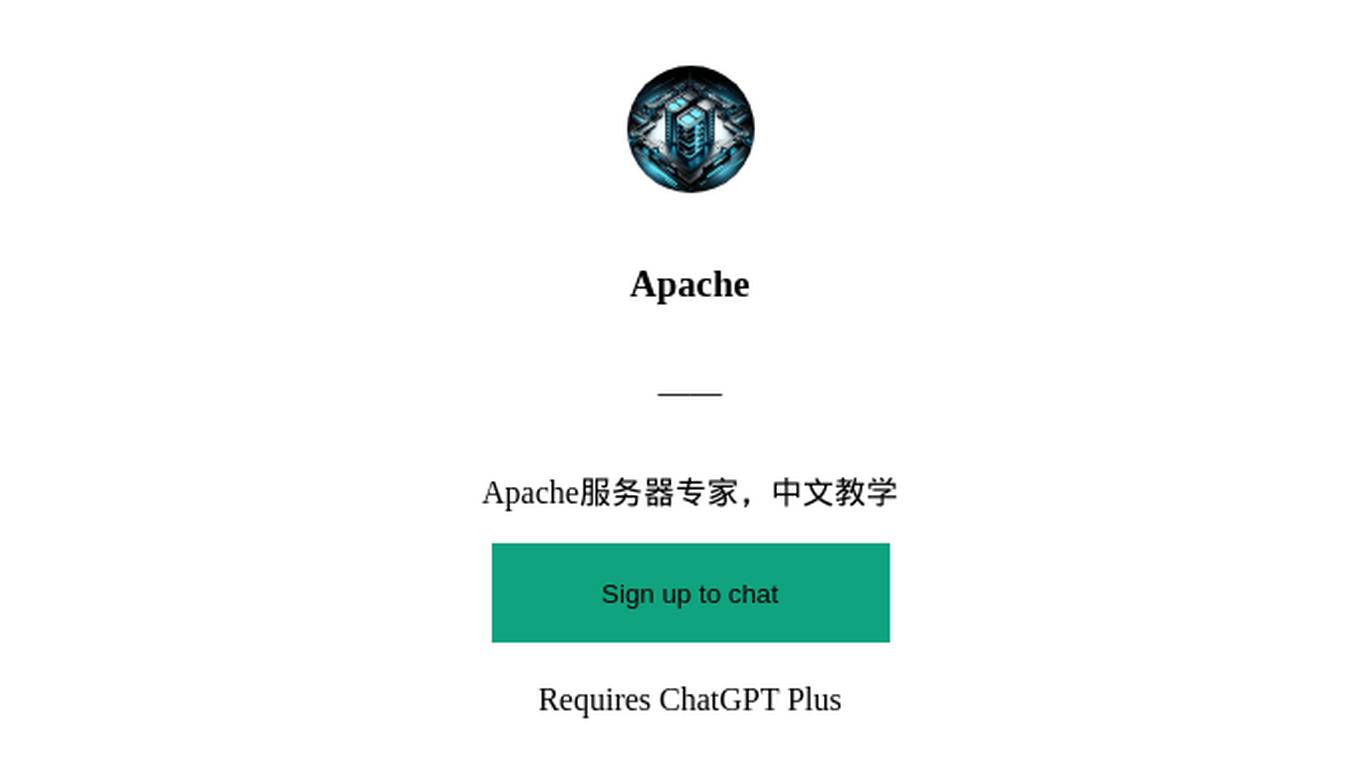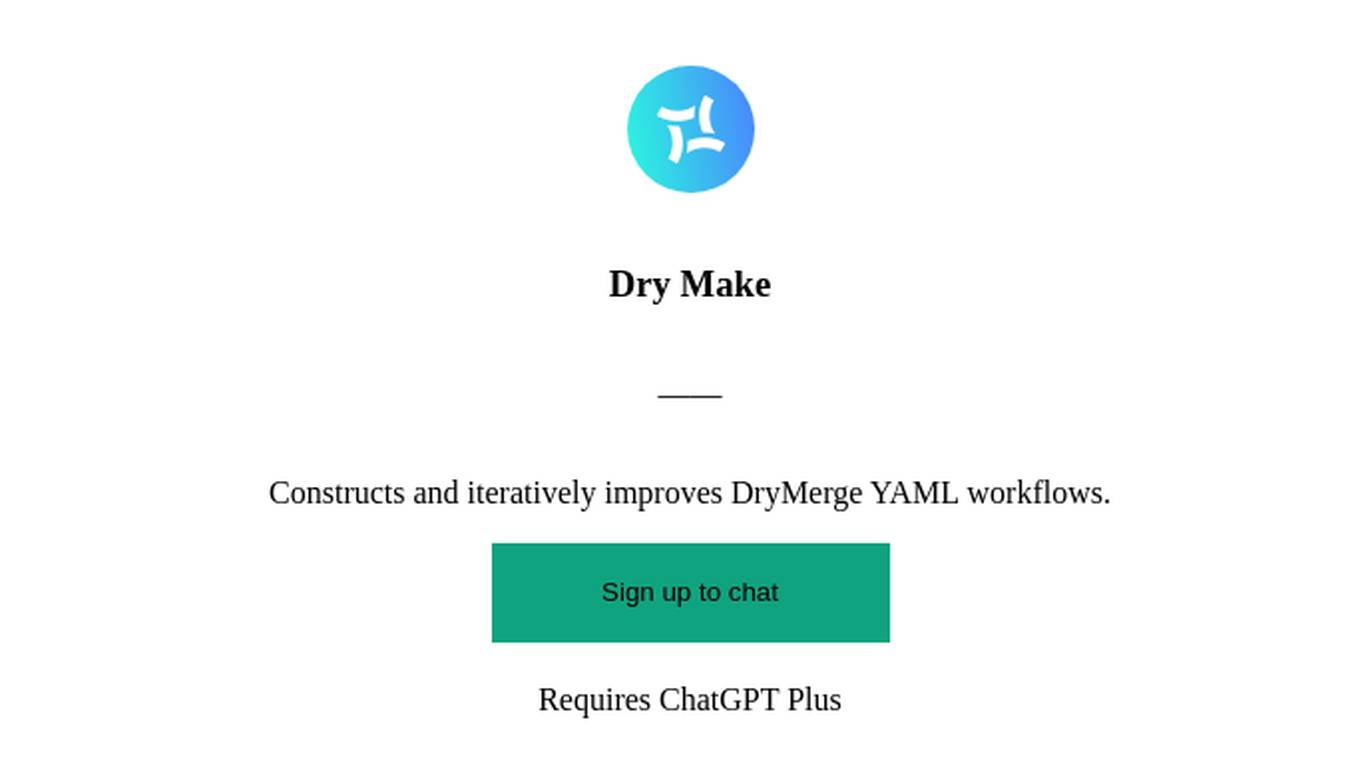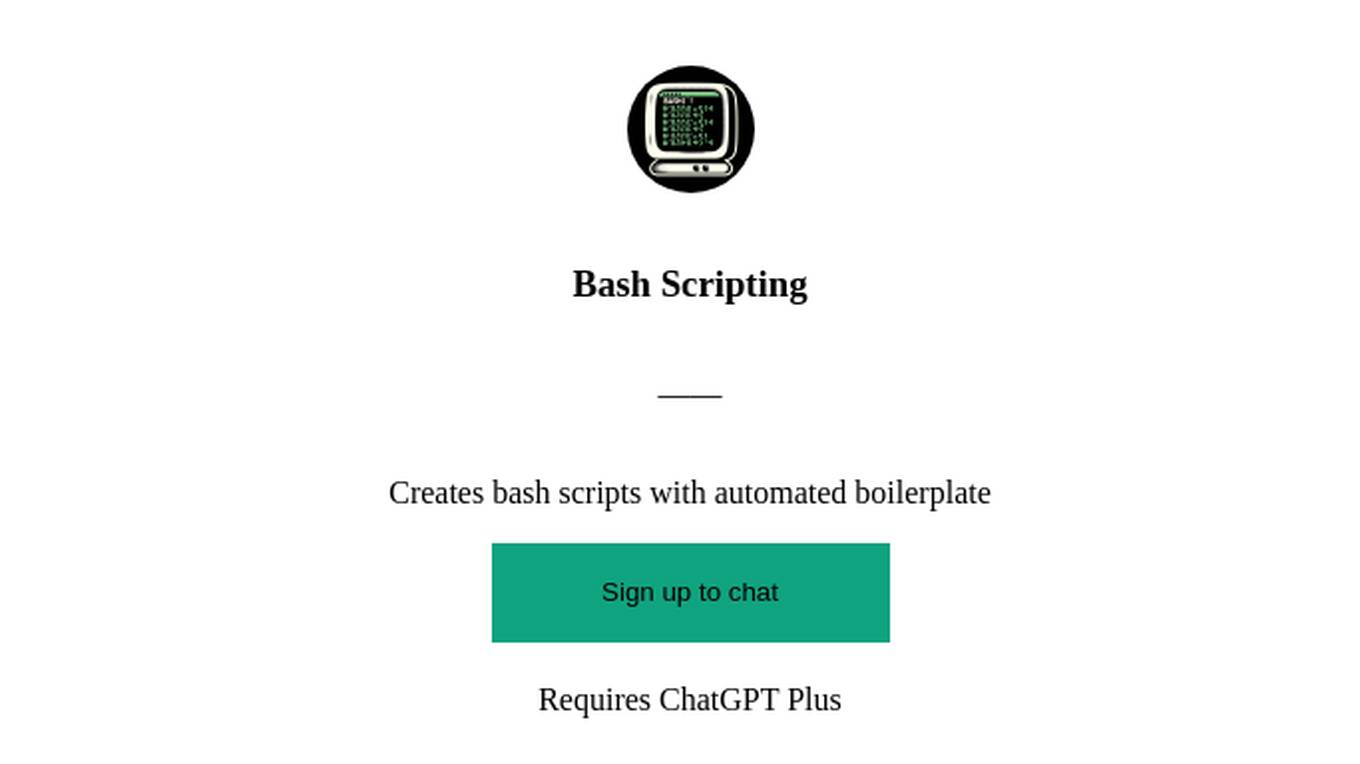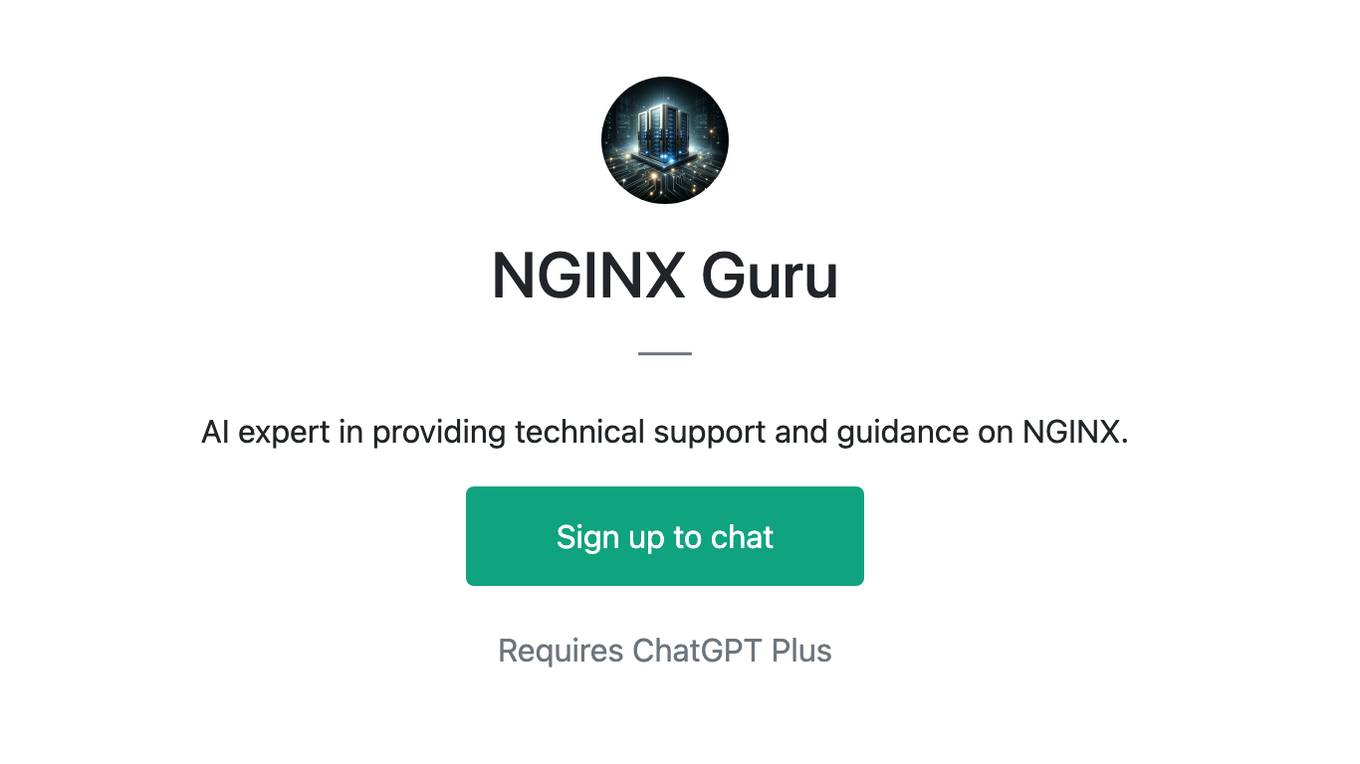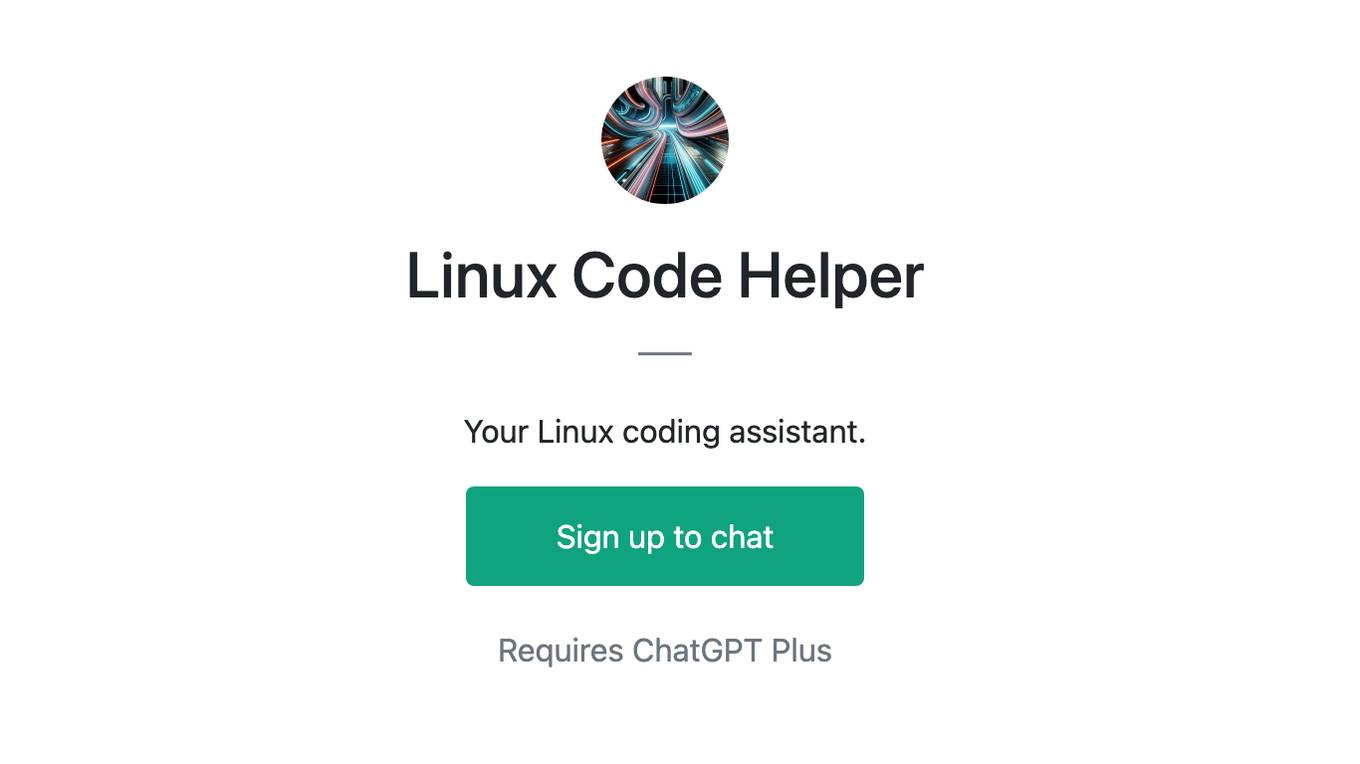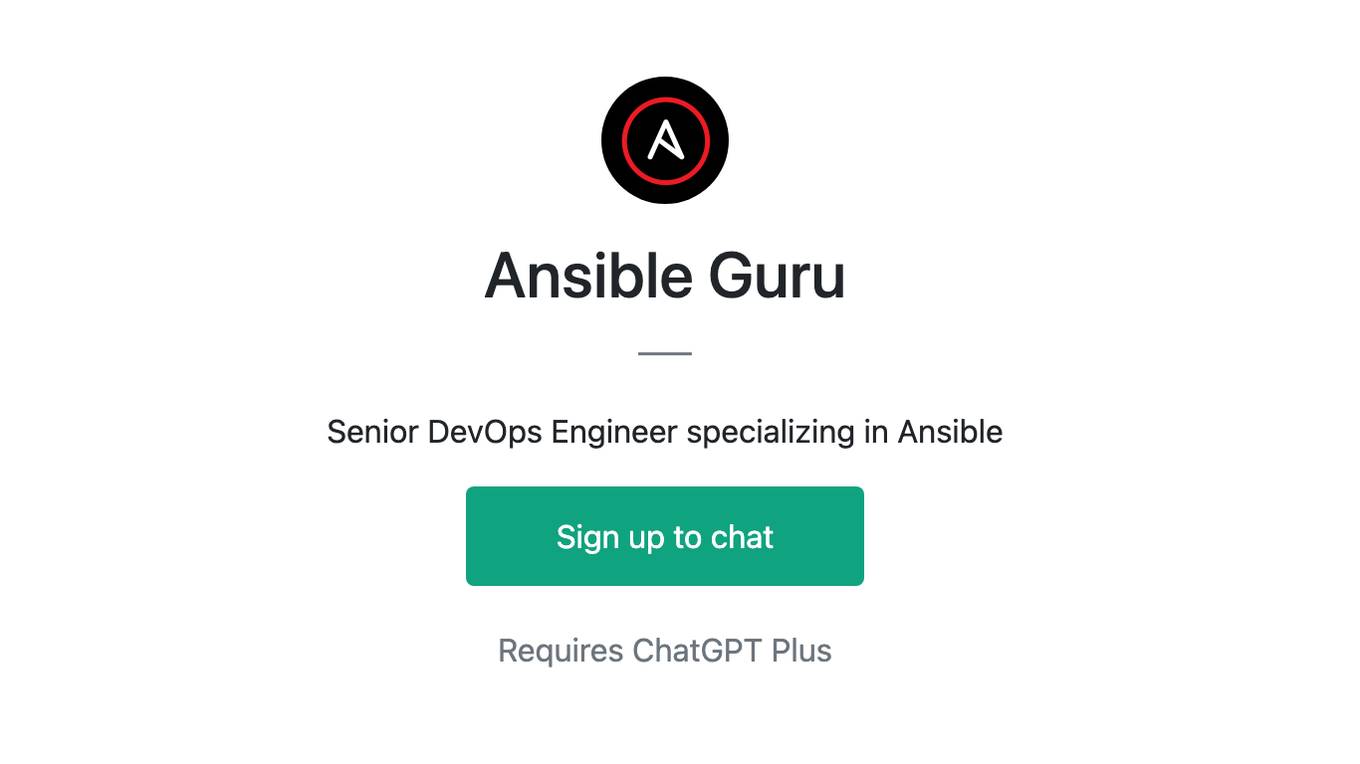Best AI tools for< Configure Settings >
20 - AI tool Sites
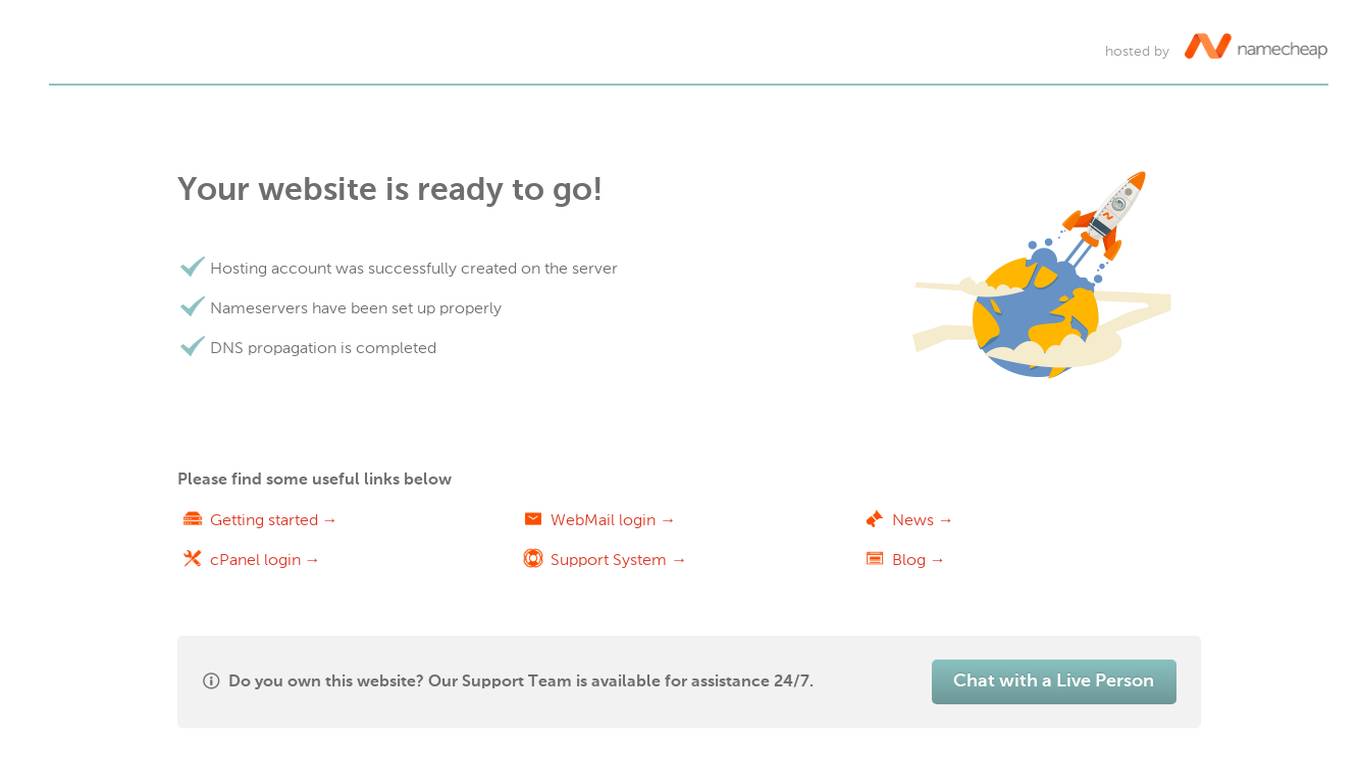
Namecheap Parking Page
Namecheap Parking Page is a hosting service that provides users with a simple and efficient way to set up their websites. The service ensures that hosting accounts are created successfully on the server, nameservers are properly set up, and DNS propagation is completed. Users can access useful links for getting started, cPanel login, WebMail login, support system, news, and blog. The support team is available 24/7 for assistance.

OpenResty
The website is currently displaying a '403 Forbidden' error, which indicates that the server understood the request but refuses to authorize it. This error is typically caused by insufficient permissions or misconfiguration on the server side. The 'openresty' message suggests that the server is using the OpenResty web platform. OpenResty is a powerful web platform based on Nginx and LuaJIT, providing high performance and flexibility for web applications.

OpenResty
The website is currently displaying a '403 Forbidden' error, which means that access to the requested resource is denied. This error is typically caused by insufficient permissions or server misconfiguration. The 'openresty' message indicates that the server is using the OpenResty web platform. OpenResty is a scalable web platform that integrates the Nginx web server with various Lua-based modules, providing powerful features for web development and server-side scripting.

OpenResty
The website is currently displaying a '403 Forbidden' error, which indicates that the server understood the request but refuses to authorize it. This error is often encountered when trying to access a webpage without the necessary permissions. The 'openresty' mentioned in the text is likely the software running on the server. It is a web platform based on NGINX and LuaJIT, known for its high performance and scalability in handling web traffic. The website may be using OpenResty to manage its server configurations and handle incoming requests.

OpenResty Server Manager
The website seems to be experiencing a 403 Forbidden error, which typically indicates that the server is denying access to the requested resource. This error is often caused by incorrect permissions or misconfigurations on the server side. The message 'openresty' suggests that the server may be using the OpenResty web platform. Users encountering this error may need to contact the website administrator for assistance in resolving the issue.
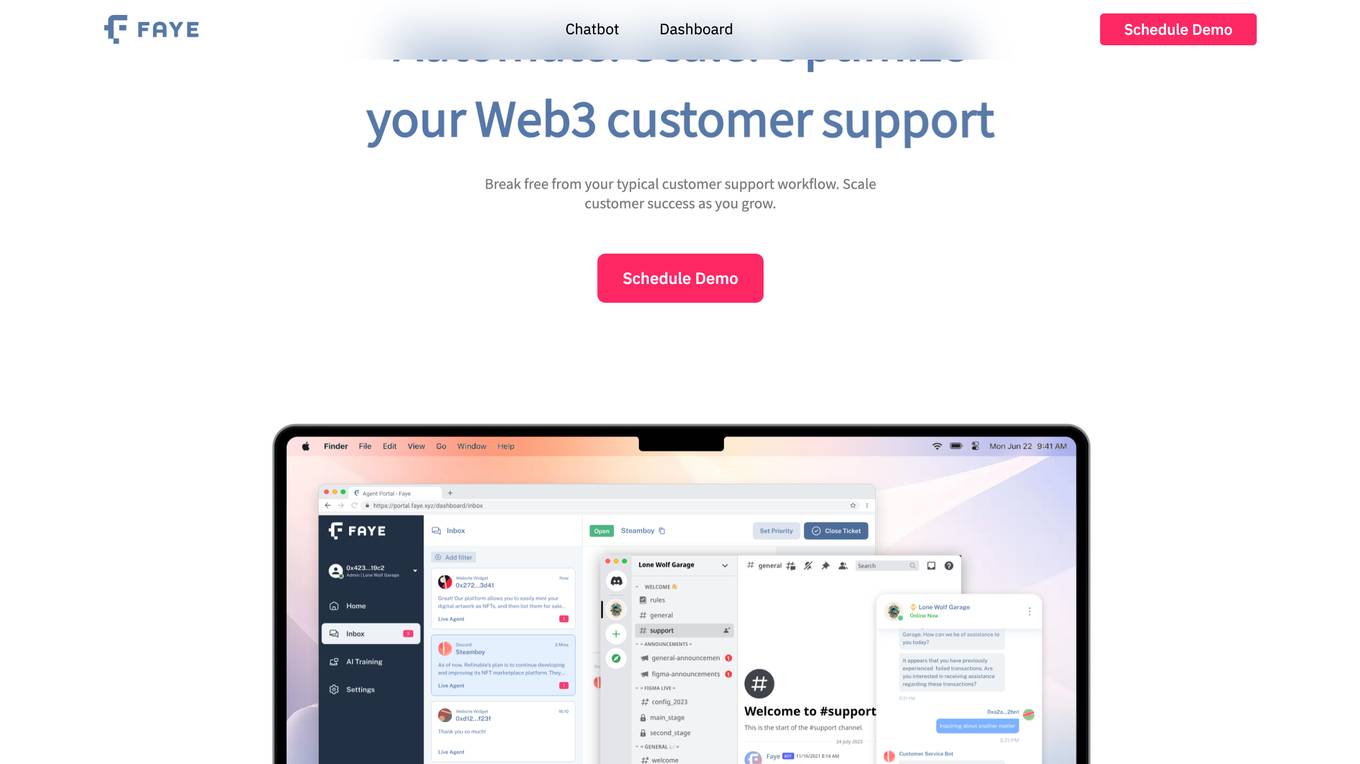
faye.xyz
faye.xyz is a website experiencing an SSL handshake failed error (Error code 525) due to Cloudflare being unable to establish an SSL connection to the origin server. The issue may be related to incompatible SSL configuration with Cloudflare, possibly due to no shared cipher suites. Visitors are advised to try again in a few minutes, while website owners are recommended to check the SSL configuration. Cloudflare provides additional troubleshooting information for resolving such errors.
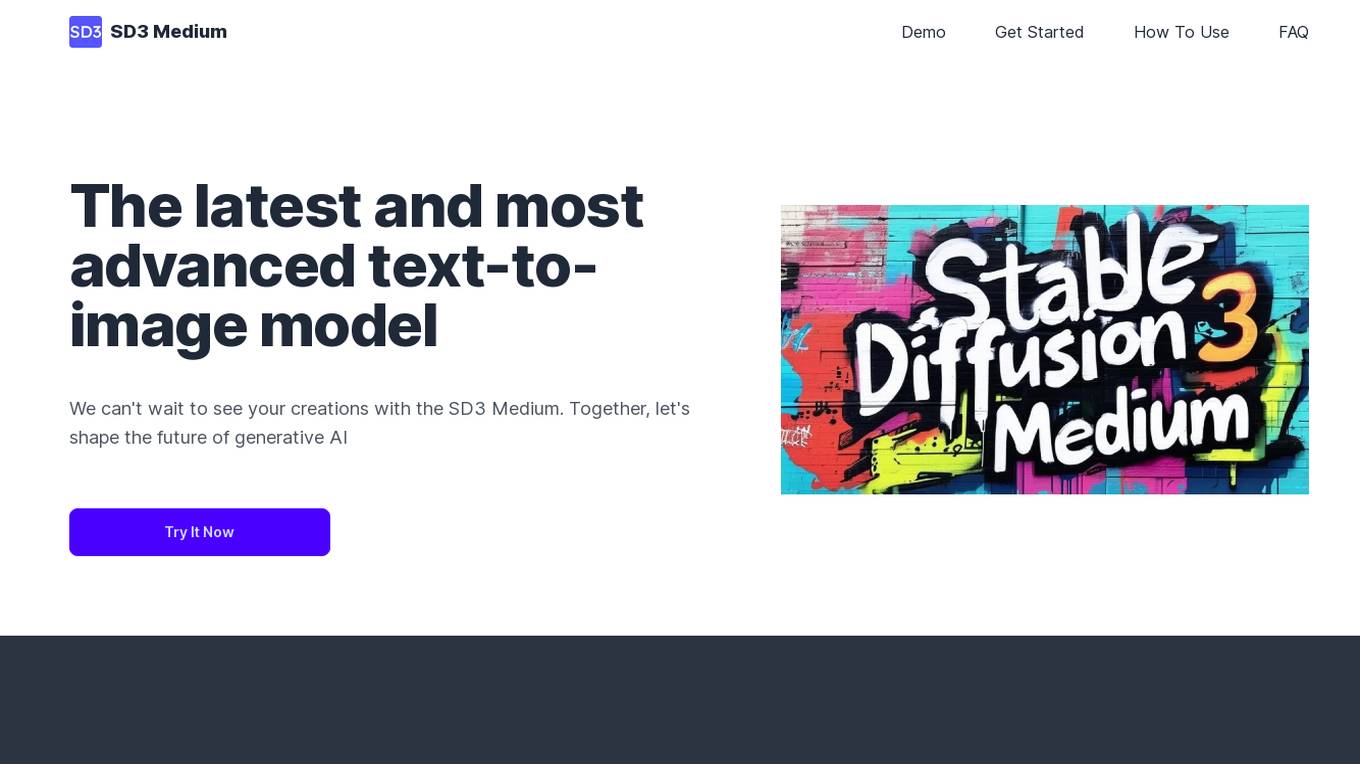
SD3 Medium
SD3 Medium is an advanced text-to-image model developed by Stability AI. It offers a cutting-edge approach to generating high-quality, photorealistic images based on textual prompts. The model is equipped with 2 billion parameters, ensuring exceptional quality and resource efficiency. SD3 Medium is currently in a research preview phase, primarily catering to educational and creative purposes. Users can access the model through various licensing options and explore its capabilities via the Stability Platform.

Domain Assignment Manager
The website is a platform for managing domain assignments. Users can easily assign domain names by accessing the site settings and inputting the domain name in the designated tab. It simplifies the process of domain management for individuals and businesses.

403 Forbidden
The website seems to be experiencing a 403 Forbidden error, which indicates that the server is refusing to respond to the request. This error is often caused by incorrect permissions on the server or misconfigured security settings. The message 'openresty' suggests that the server may be running on the OpenResty web platform. OpenResty is a web platform based on NGINX and LuaJIT, known for its high performance and scalability. Users encountering a 403 Forbidden error on a website may need to contact the website administrator or webmaster for assistance in resolving the issue.

OpenResty
The website appears to be displaying a '403 Forbidden' error message, which indicates that the server is refusing to respond to the request. This error is often caused by incorrect permissions on the server or a misconfiguration in the server settings. The message 'openresty' suggests that the server may be running the OpenResty web platform. OpenResty is a web platform based on NGINX and Lua that is commonly used to build high-performance web applications. It provides a powerful and flexible way to extend NGINX with Lua scripts, allowing for advanced web server functionality.
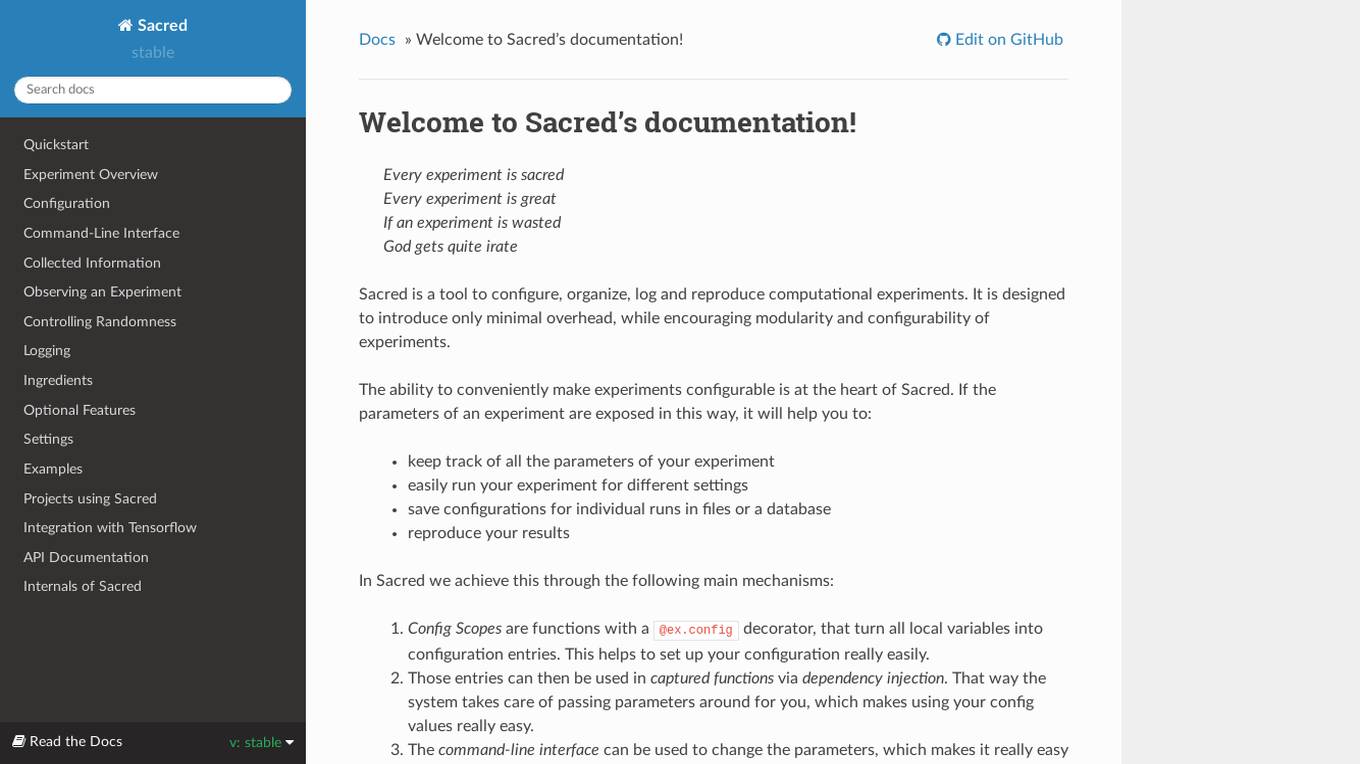
Sacred
Sacred is a tool to configure, organize, log and reproduce computational experiments. It is designed to introduce only minimal overhead, while encouraging modularity and configurability of experiments. The ability to conveniently make experiments configurable is at the heart of Sacred. If the parameters of an experiment are exposed in this way, it will help you to: keep track of all the parameters of your experiment easily run your experiment for different settings save configurations for individual runs in files or a database reproduce your results In Sacred we achieve this through the following main mechanisms: Config Scopes are functions with a @ex.config decorator, that turn all local variables into configuration entries. This helps to set up your configuration really easily. Those entries can then be used in captured functions via dependency injection. That way the system takes care of passing parameters around for you, which makes using your config values really easy. The command-line interface can be used to change the parameters, which makes it really easy to run your experiment with modified parameters. Observers log every information about your experiment and the configuration you used, and saves them for example to a Database. This helps to keep track of all your experiments. Automatic seeding helps controlling the randomness in your experiments, such that they stay reproducible.

SolidGrids
SolidGrids is an AI-powered image enhancement tool designed specifically for e-commerce businesses. It automates the image post-production process, saving time and resources. With SolidGrids, you can easily remove backgrounds, enhance product images, and create consistent branding across your e-commerce site. The platform offers seamless cloud integrations and is cost-effective compared to traditional methods.
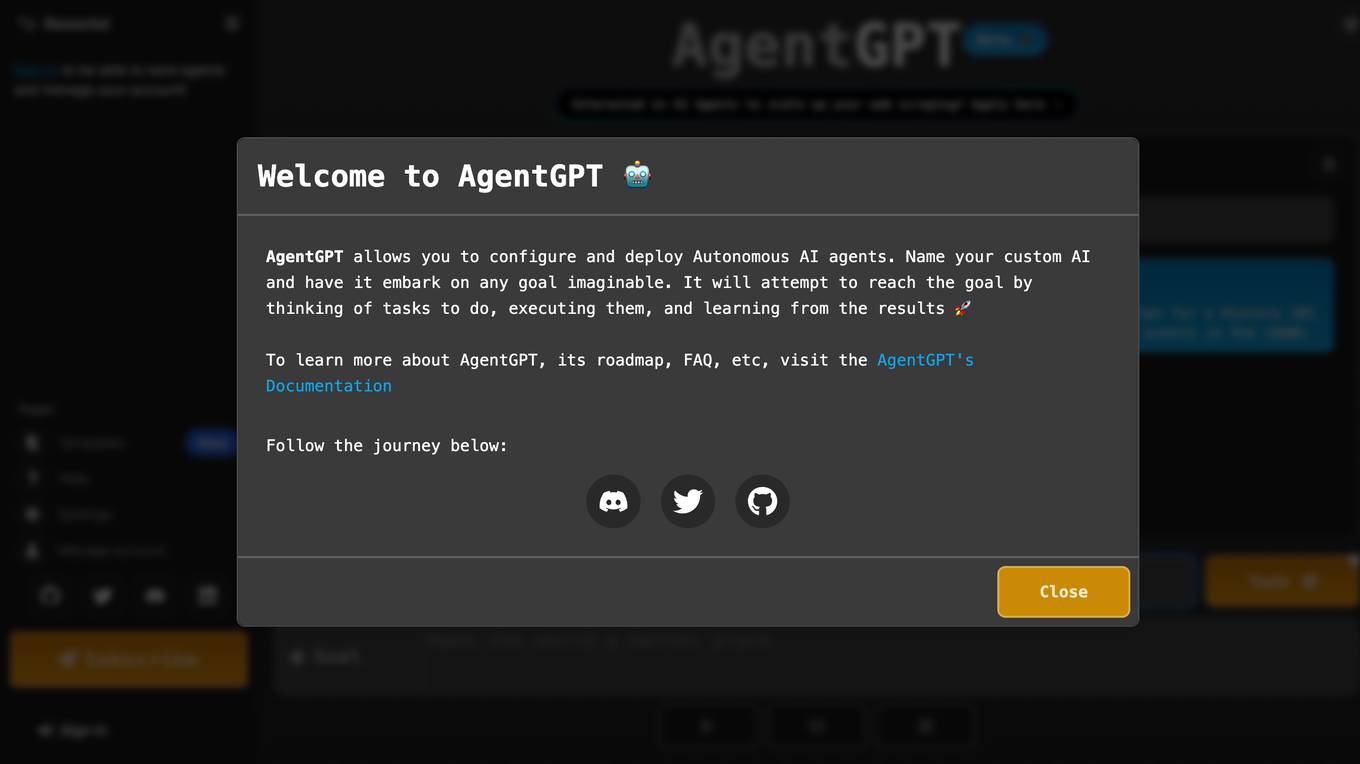
AgentGPT
AgentGPT is an AI tool designed to assist users in various tasks by generating text based on specific inputs. It leverages the power of AI to create agents that can help with web scraping, report generation, trip planning, study plan creation, and more. Users can easily deploy agents by providing a name and goal, making it a versatile tool for a wide range of applications.

SendingFlow
SendingFlow is a marketing automation tool specifically designed for Webflow websites. It offers a simple and powerful platform for email marketing, with features such as email series generation, templates, and data-driven decision-making. The tool aims to streamline workflows, protect sender reputation, and help users make data-driven decisions to enhance their email campaigns. SendingFlow is backed by Petit Hack, a Webflow agency dedicated to empowering marketers by providing intuitive tools for effective email marketing on the Webflow platform.
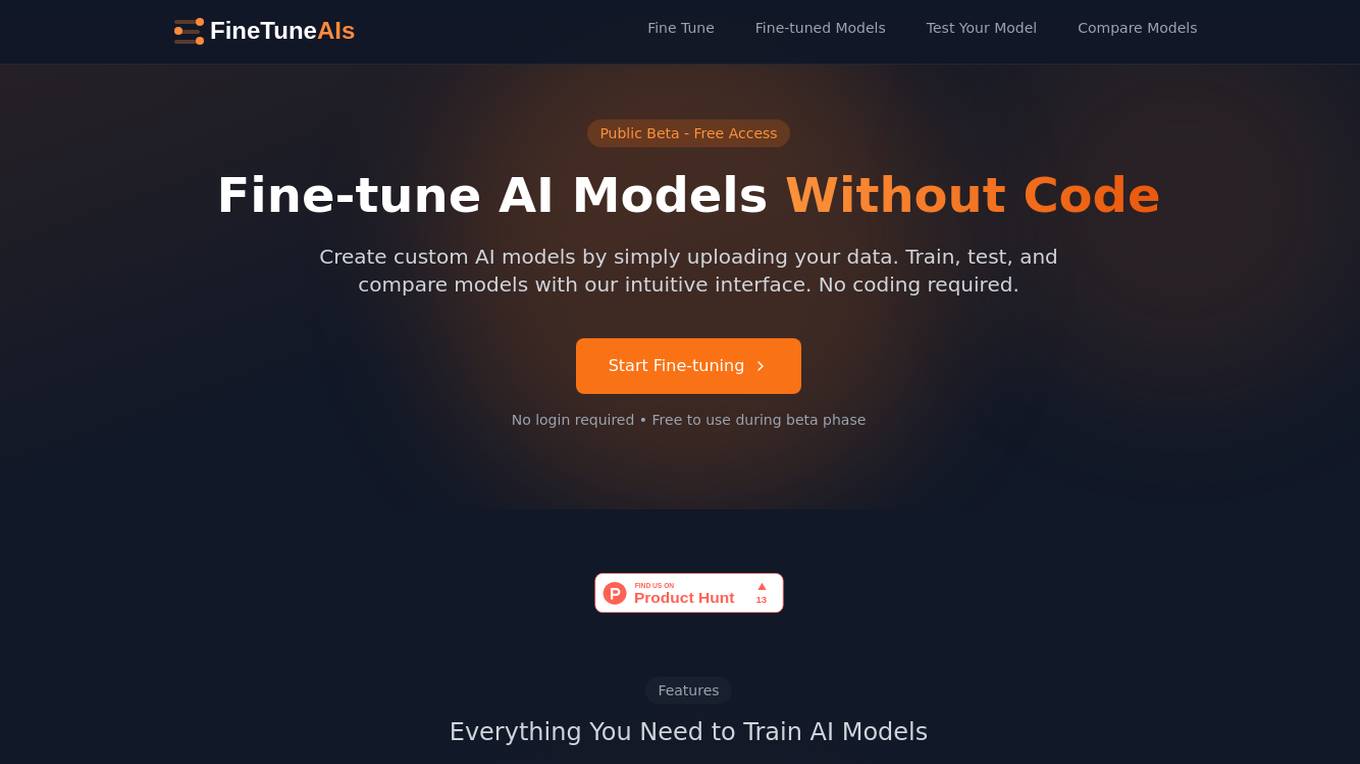
FineTuneAIs.com
FineTuneAIs.com is a platform that specializes in custom AI model fine-tuning. Users can fine-tune their AI models to achieve better performance and accuracy. The platform requires JavaScript to be enabled for optimal functionality.
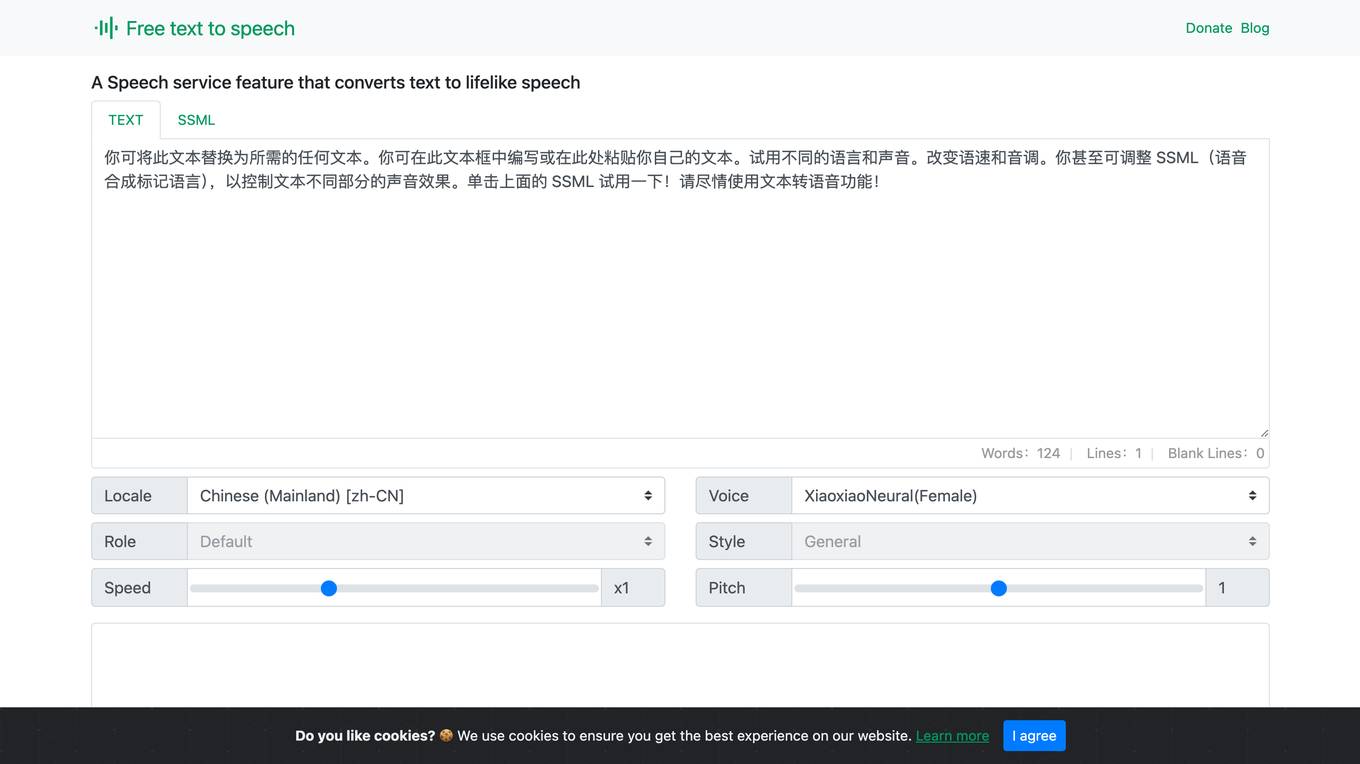
Free Text to Speech Online Converter Tools
This website provides a free text-to-speech converter tool that utilizes Microsoft's AI speech library to synthesize realistic-sounding speech from text. It offers customizable voice options, fine-tuned speech controls, and multilingual support with over 330 neural network voices across 129 languages. The tool is accessible on various browsers, including Chrome, Firefox, and Edge, and can be used for a range of applications, such as text readers and voice-enabled assistants.

MiClient.ai
MiClient.ai is an AI-powered Sales automation SaaS that offers a Lead Management System Software to streamline the deal closure process for businesses. It provides a comprehensive CRM software with CPQ capabilities, enabling users to manage their pipeline, create deals, send proposals, co-review deals with customers, and close contracts with e-signatures. MiClient.ai aims to boost sales efficiency by automating client interactions, speeding up proposal sending, eliminating quoting errors, and maximizing revenue through intelligent pricing strategies.

ITVA
ITVA is an AI automation tool for network infrastructure products that revolutionizes network management by enabling users to configure, query, and document their network using natural language. It offers features such as rapid configuration deployment, network diagnostics acceleration, automated diagram generation, and modernized IP address management. ITVA's unique solution securely connects to networks, combining real-time data with a proprietary dataset curated by veteran engineers. The tool ensures unparalleled accuracy and insights through its real-time data pipeline and on-demand dynamic analysis capabilities.
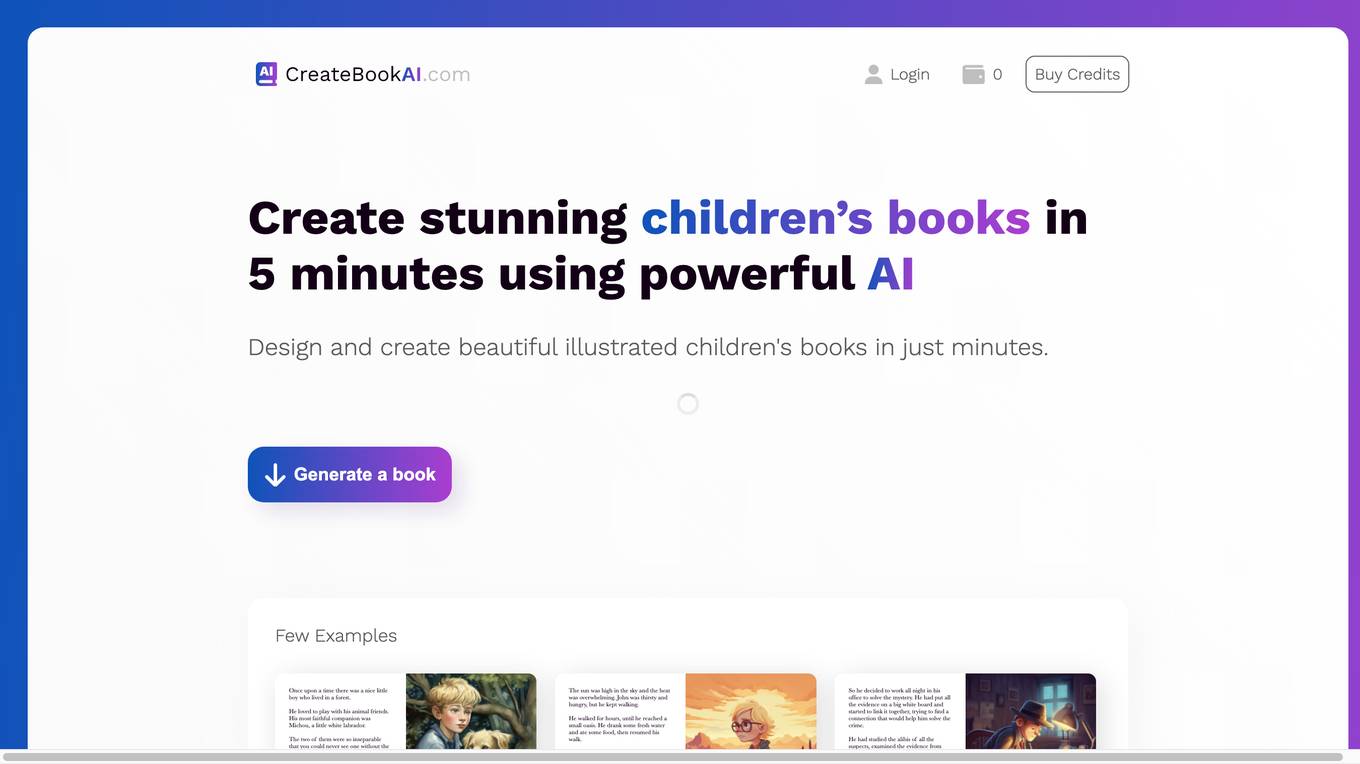
OpenResty
The website is currently displaying a '403 Forbidden' error, which means that access to the requested resource is denied. This error is typically caused by insufficient permissions or server misconfiguration. The 'openresty' message indicates that the server is using the OpenResty web platform. OpenResty is a web platform based on NGINX and LuaJIT, often used for building high-performance web applications. The website may be experiencing technical issues that prevent users from accessing its content.

Cloobot X
Cloobot X is a Gen-AI-powered implementation studio that accelerates the deployment of enterprise applications with fewer resources. It leverages natural language processing to model workflow automation, deliver sandbox previews, configure workflows, extend functionalities, and manage versioning & changes. The platform aims to streamline enterprise application deployments, making them simple, swift, and efficient for all stakeholders.
29 - Open Source AI Tools
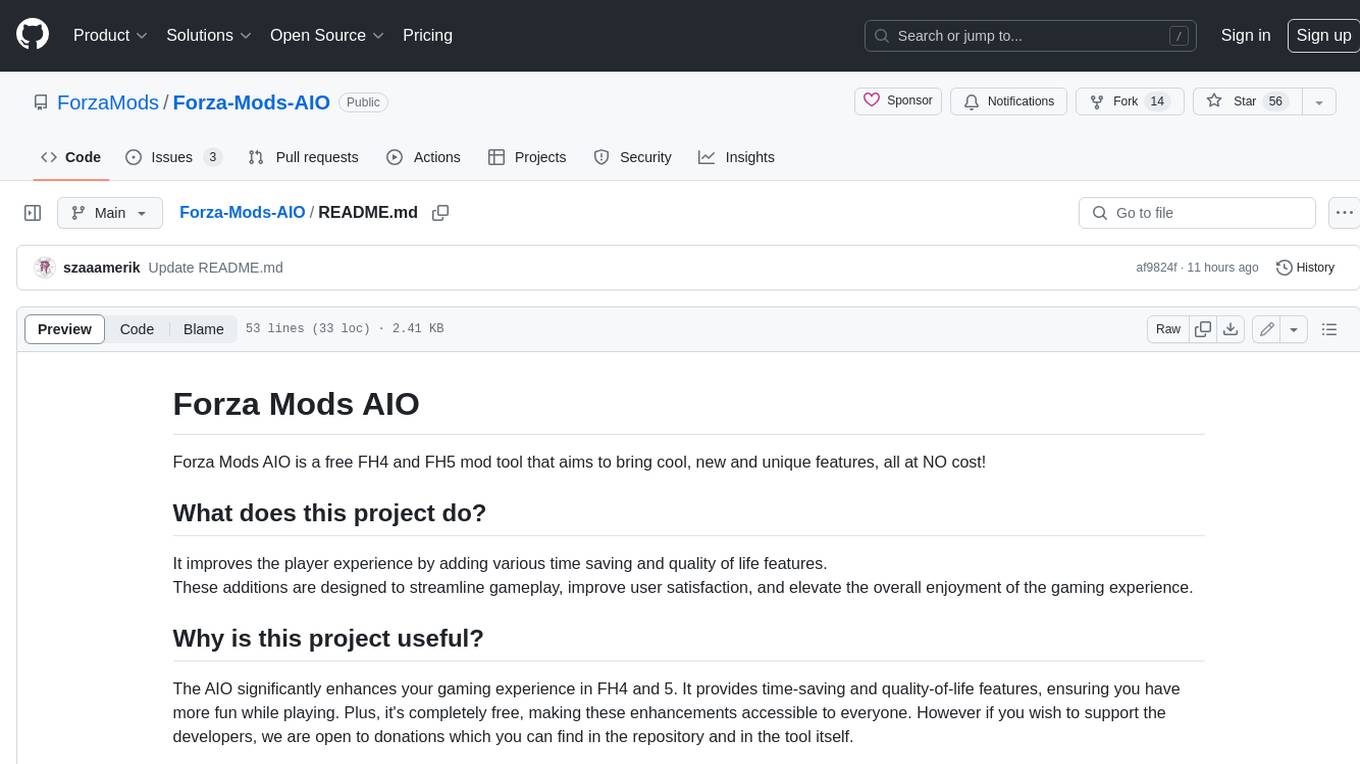
Forza-Mods-AIO
Forza Mods AIO is a free and open-source tool that enhances the gaming experience in Forza Horizon 4 and 5. It offers a range of time-saving and quality-of-life features, making gameplay more enjoyable and efficient. The tool is designed to streamline various aspects of the game, improving user satisfaction and overall enjoyment.

hass-ollama-conversation
The Ollama Conversation integration adds a conversation agent powered by Ollama in Home Assistant. This agent can be used in automations to query information provided by Home Assistant about your house, including areas, devices, and their states. Users can install the integration via HACS and configure settings such as API timeout, model selection, context size, maximum tokens, and other parameters to fine-tune the responses generated by the AI language model. Contributions to the project are welcome, and discussions can be held on the Home Assistant Community platform.

crawl4ai
Crawl4AI is a powerful and free web crawling service that extracts valuable data from websites and provides LLM-friendly output formats. It supports crawling multiple URLs simultaneously, replaces media tags with ALT, and is completely free to use and open-source. Users can integrate Crawl4AI into Python projects as a library or run it as a standalone local server. The tool allows users to crawl and extract data from specified URLs using different providers and models, with options to include raw HTML content, force fresh crawls, and extract meaningful text blocks. Configuration settings can be adjusted in the `crawler/config.py` file to customize providers, API keys, chunk processing, and word thresholds. Contributions to Crawl4AI are welcome from the open-source community to enhance its value for AI enthusiasts and developers.
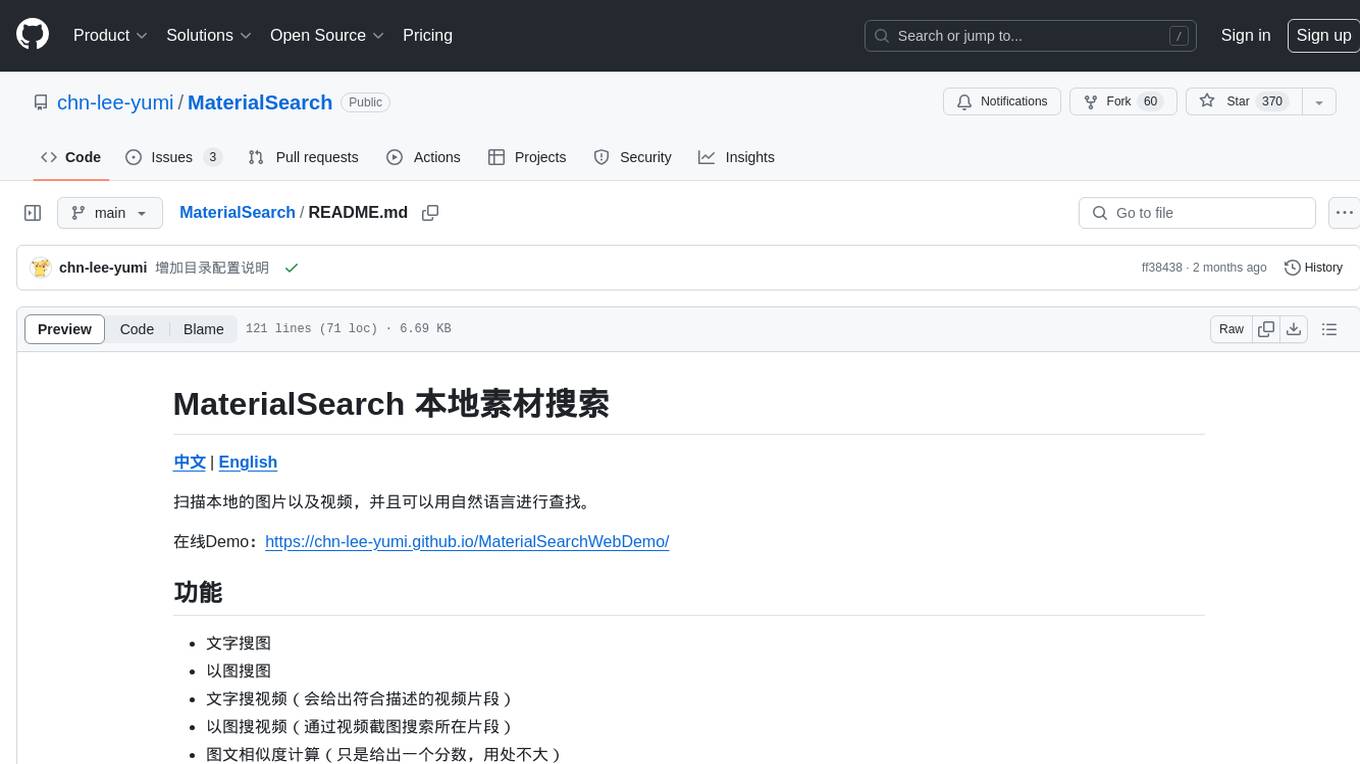
MaterialSearch
MaterialSearch is a tool for searching local images and videos using natural language. It provides functionalities such as text search for images, image search for images, text search for videos (providing matching video clips), image search for videos (searching for the segment in a video through a screenshot), image-text similarity calculation, and Pexels video search. The tool can be deployed through the source code or Docker image, and it supports GPU acceleration. Users can configure the tool through environment variables or a .env file. The tool is still under development, and configurations may change frequently. Users can report issues or suggest improvements through issues or pull requests.
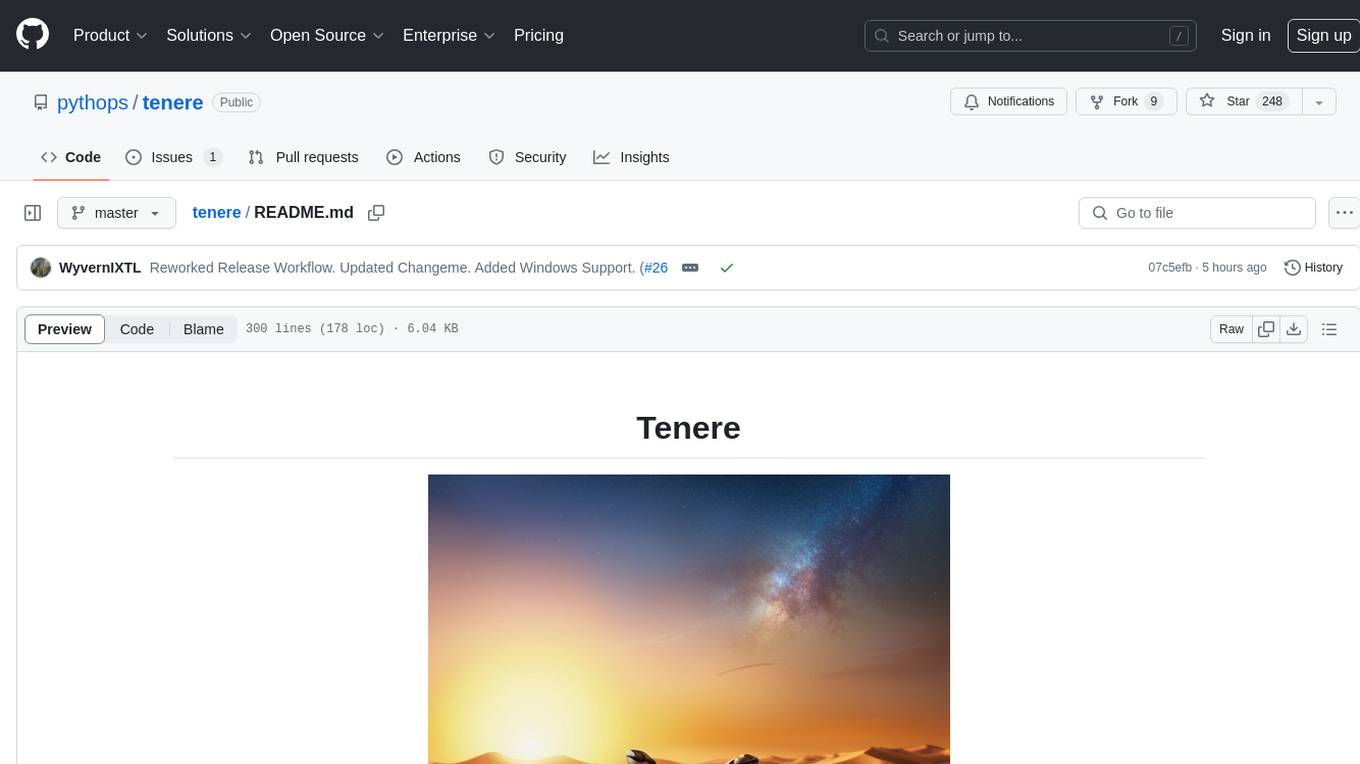
tenere
Tenere is a TUI interface for Language Model Libraries (LLMs) written in Rust. It provides syntax highlighting, chat history, saving chats to files, Vim keybindings, copying text from/to clipboard, and supports multiple backends. Users can configure Tenere using a TOML configuration file, set key bindings, and use different LLMs such as ChatGPT, llama.cpp, and ollama. Tenere offers default key bindings for global and prompt modes, with features like starting a new chat, saving chats, scrolling, showing chat history, and quitting the app. Users can interact with the prompt in different modes like Normal, Visual, and Insert, with various key bindings for navigation, editing, and text manipulation.
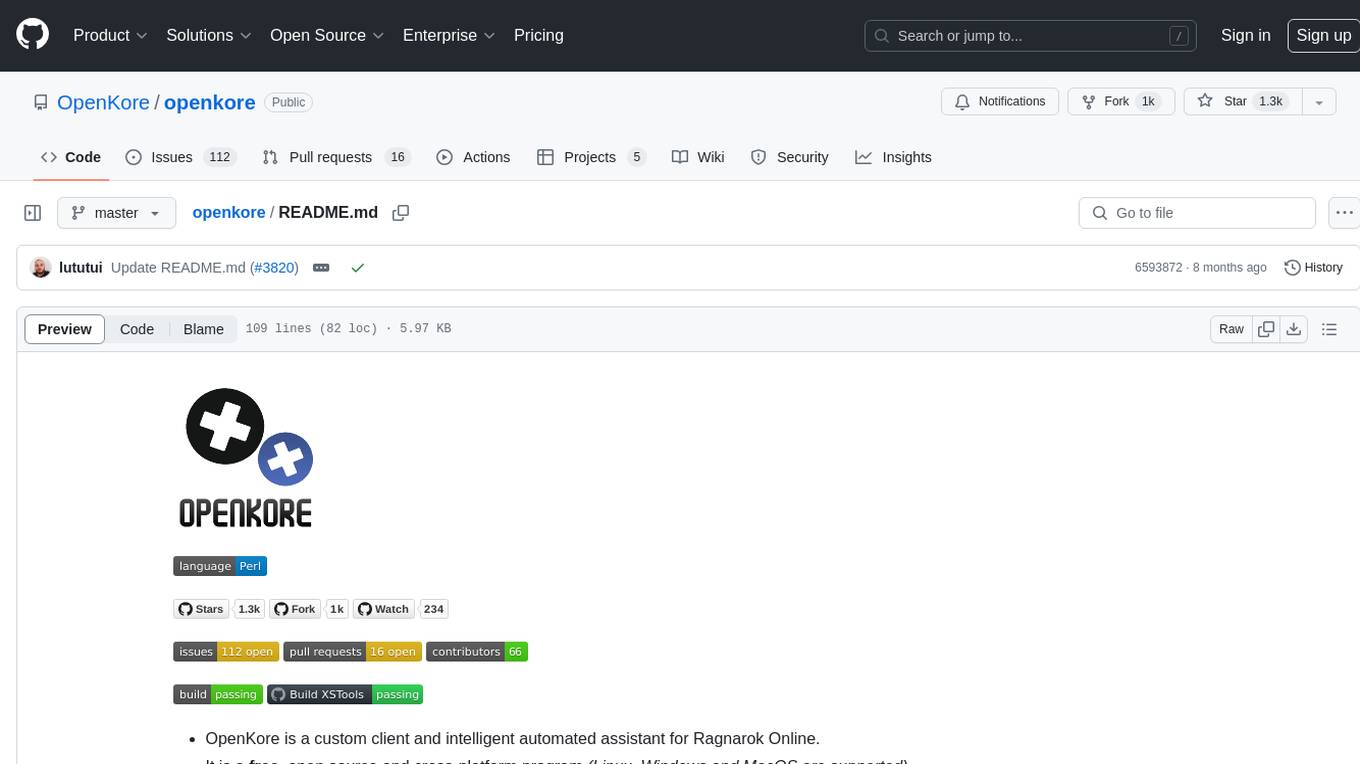
openkore
OpenKore is a custom client and intelligent automated assistant for Ragnarok Online. It is a free, open source, and cross-platform program (Linux, Windows, and MacOS are supported). To run OpenKore, you need to download and extract it or clone the repository using Git. Configure OpenKore according to the documentation and run openkore.pl to start. The tool provides a FAQ section for troubleshooting, guidelines for reporting issues, and information about botting status on official servers. OpenKore is developed by a global team, and contributions are welcome through pull requests. Various community resources are available for support and communication. Users are advised to comply with the GNU General Public License when using and distributing the software.
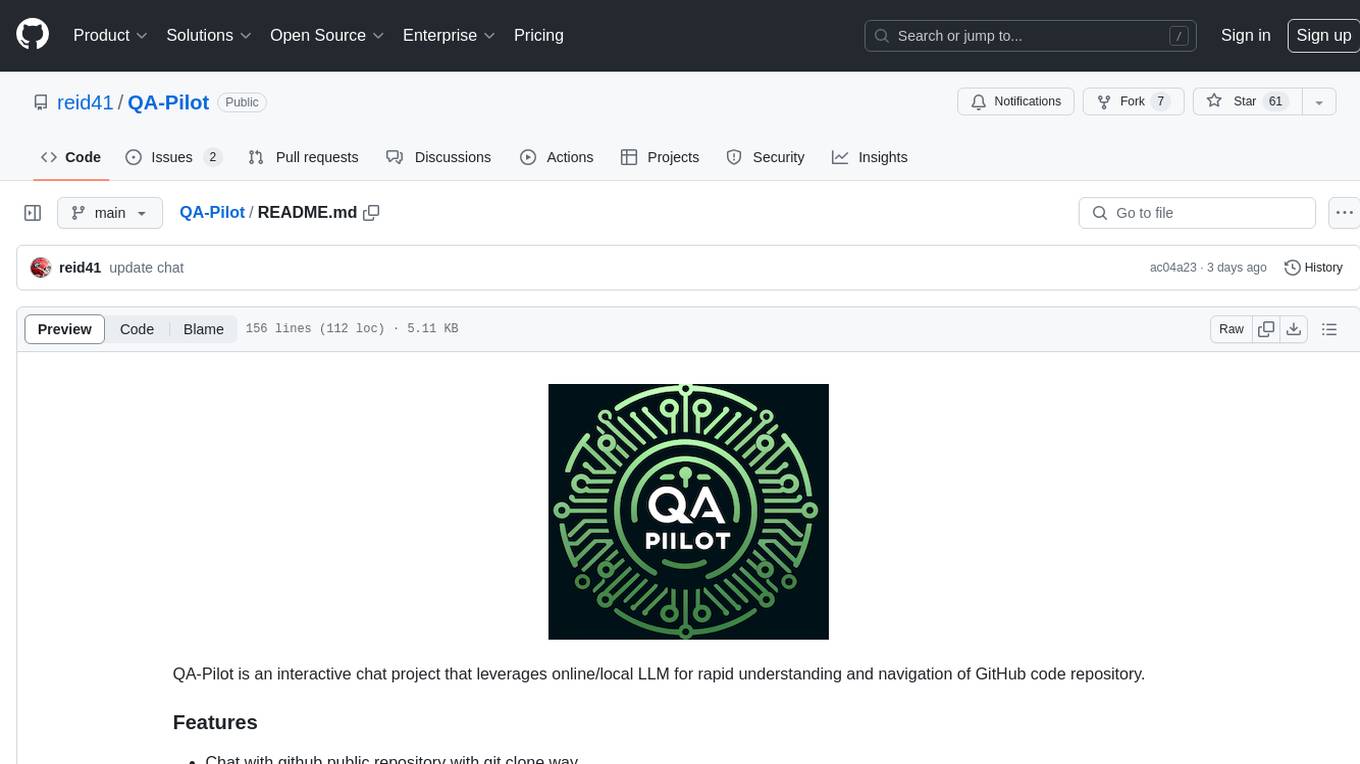
QA-Pilot
QA-Pilot is an interactive chat project that leverages online/local LLM for rapid understanding and navigation of GitHub code repository. It allows users to chat with GitHub public repositories using a git clone approach, store chat history, configure settings easily, manage multiple chat sessions, and quickly locate sessions with a search function. The tool integrates with `codegraph` to view Python files and supports various LLM models such as ollama, openai, mistralai, and localai. The project is continuously updated with new features and improvements, such as converting from `flask` to `fastapi`, adding `localai` API support, and upgrading dependencies like `langchain` and `Streamlit` to enhance performance.
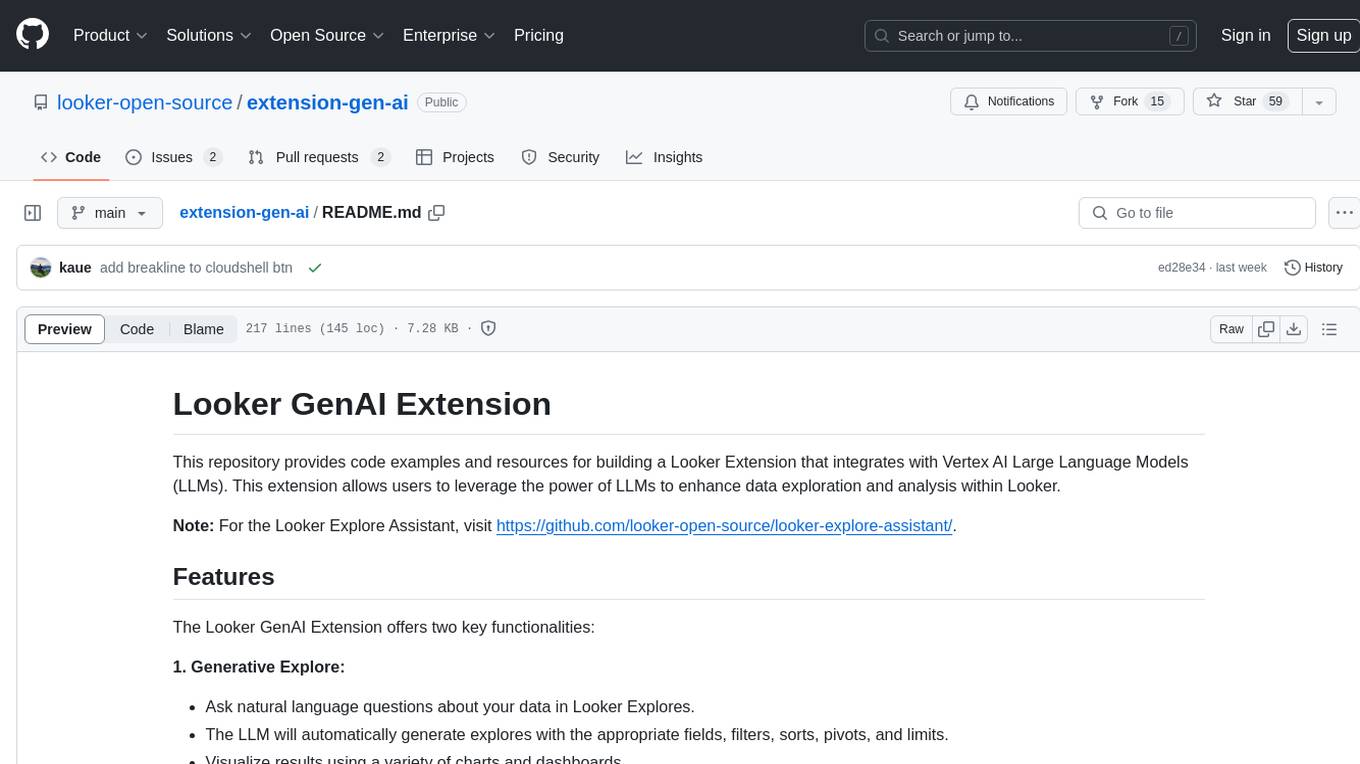
extension-gen-ai
The Looker GenAI Extension provides code examples and resources for building a Looker Extension that integrates with Vertex AI Large Language Models (LLMs). Users can leverage the power of LLMs to enhance data exploration and analysis within Looker. The extension offers generative explore functionality to ask natural language questions about data and generative insights on dashboards to analyze data by asking questions. It leverages components like BQML Remote Models, BQML Remote UDF with Vertex AI, and Custom Fine Tune Model for different integration options. Deployment involves setting up infrastructure with Terraform and deploying the Looker Extension by creating a Looker project, copying extension files, configuring BigQuery connection, connecting to Git, and testing the extension. Users can save example prompts and configure user settings for the extension. Development of the Looker Extension environment includes installing dependencies, starting the development server, and building for production.
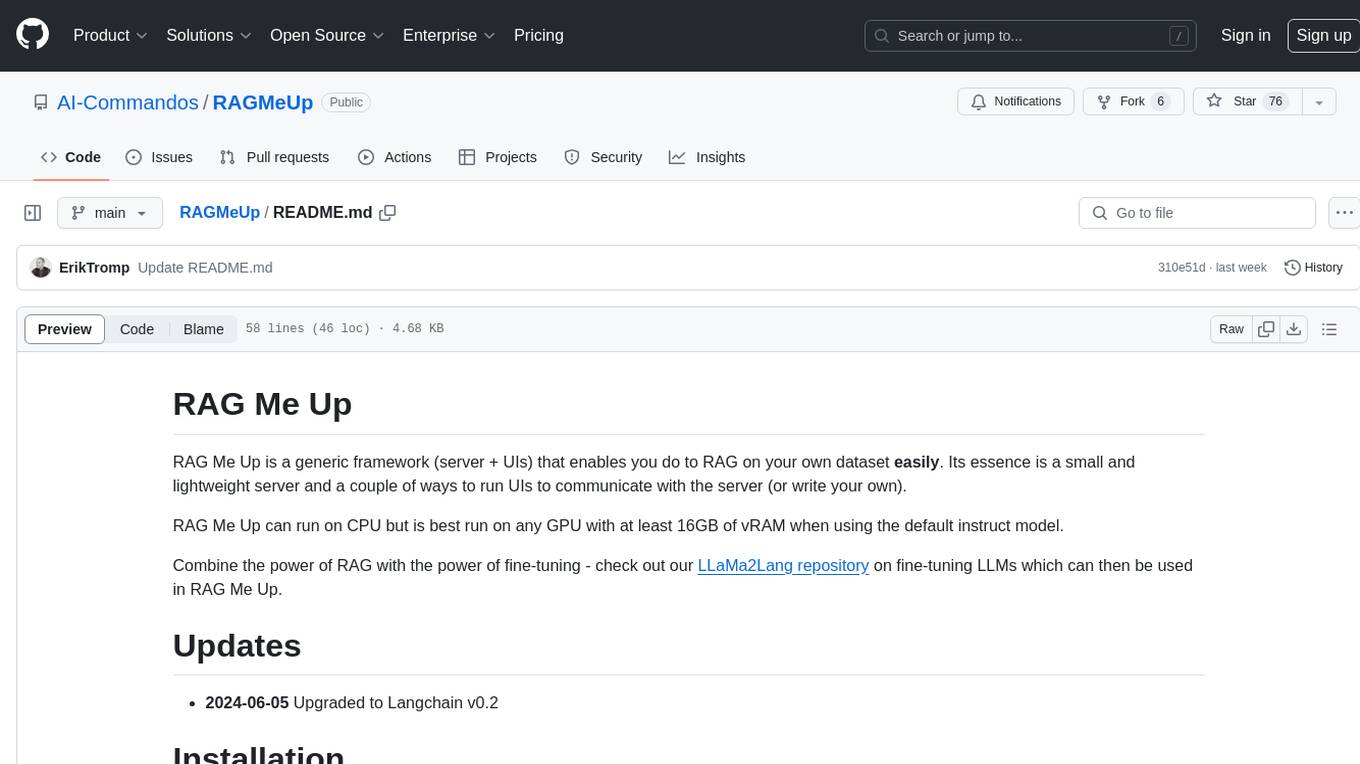
RAGMeUp
RAG Me Up is a generic framework that enables users to perform Retrieve and Generate (RAG) on their own dataset easily. It consists of a small server and UIs for communication. Best run on GPU with 16GB vRAM. Users can combine RAG with fine-tuning using LLaMa2Lang repository. The tool allows configuration for LLM, data, LLM parameters, prompt, and document splitting. Funding is sought to democratize AI and advance its applications.
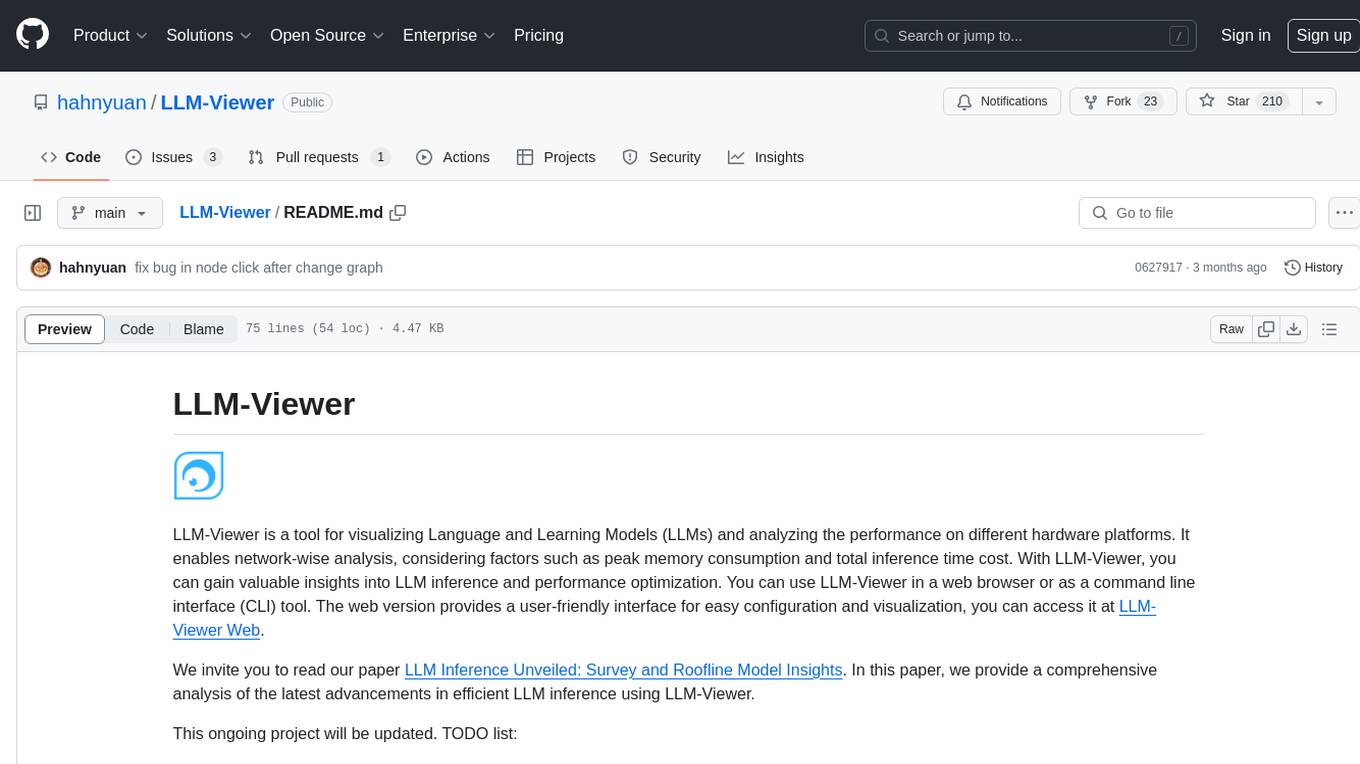
LLM-Viewer
LLM-Viewer is a tool for visualizing Language and Learning Models (LLMs) and analyzing performance on different hardware platforms. It enables network-wise analysis, considering factors such as peak memory consumption and total inference time cost. With LLM-Viewer, users can gain valuable insights into LLM inference and performance optimization. The tool can be used in a web browser or as a command line interface (CLI) for easy configuration and visualization. The ongoing project aims to enhance features like showing tensor shapes, expanding hardware platform compatibility, and supporting more LLMs with manual model graph configuration.
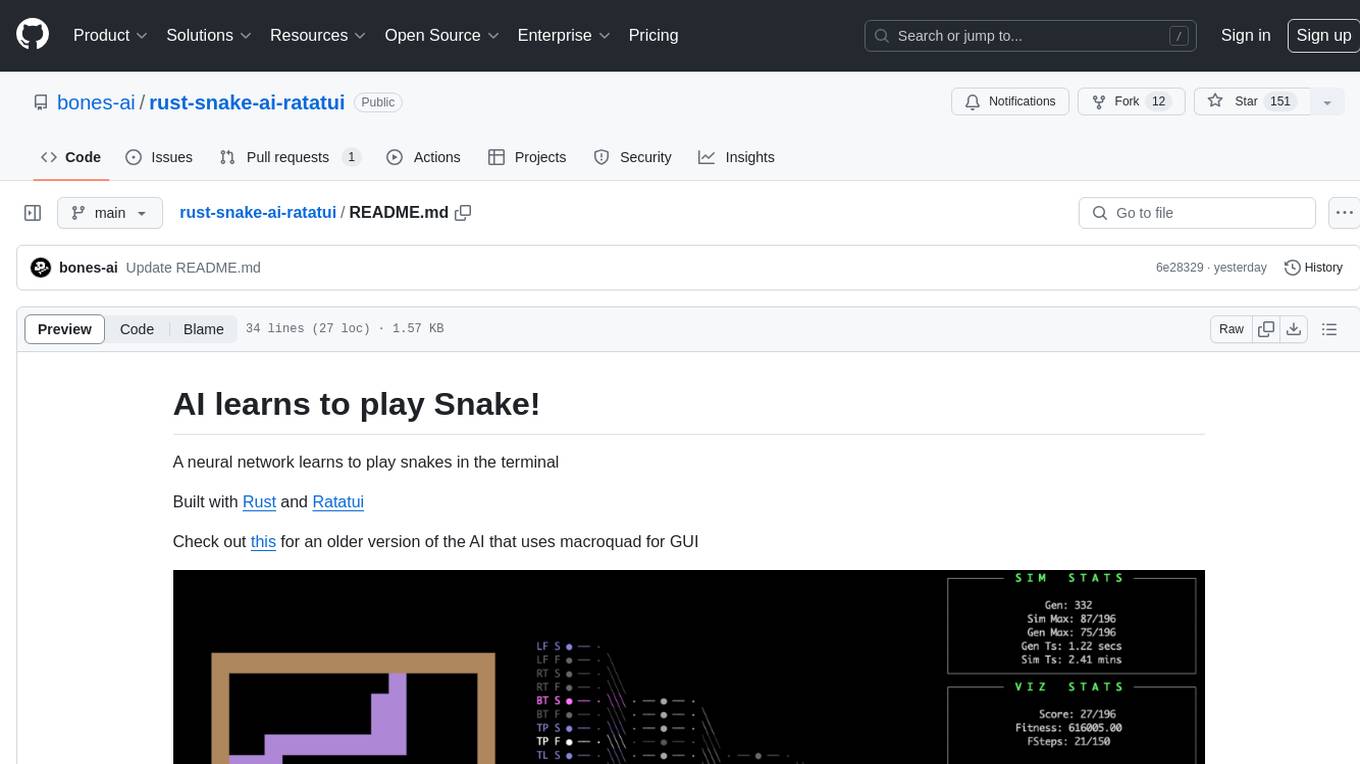
rust-snake-ai-ratatui
This repository contains an AI implementation that learns to play the classic game Snake in the terminal. The AI is built using Rust and Ratatui. Users can clone the repo, run the simulation, and configure various settings to customize the AI's behavior. The project also provides options for minimal UI, training custom networks, and watching the AI complete the game on different board sizes. The developer shares updates and insights about the project on Twitter and plans to create a detailed blog post explaining the AI's workings.
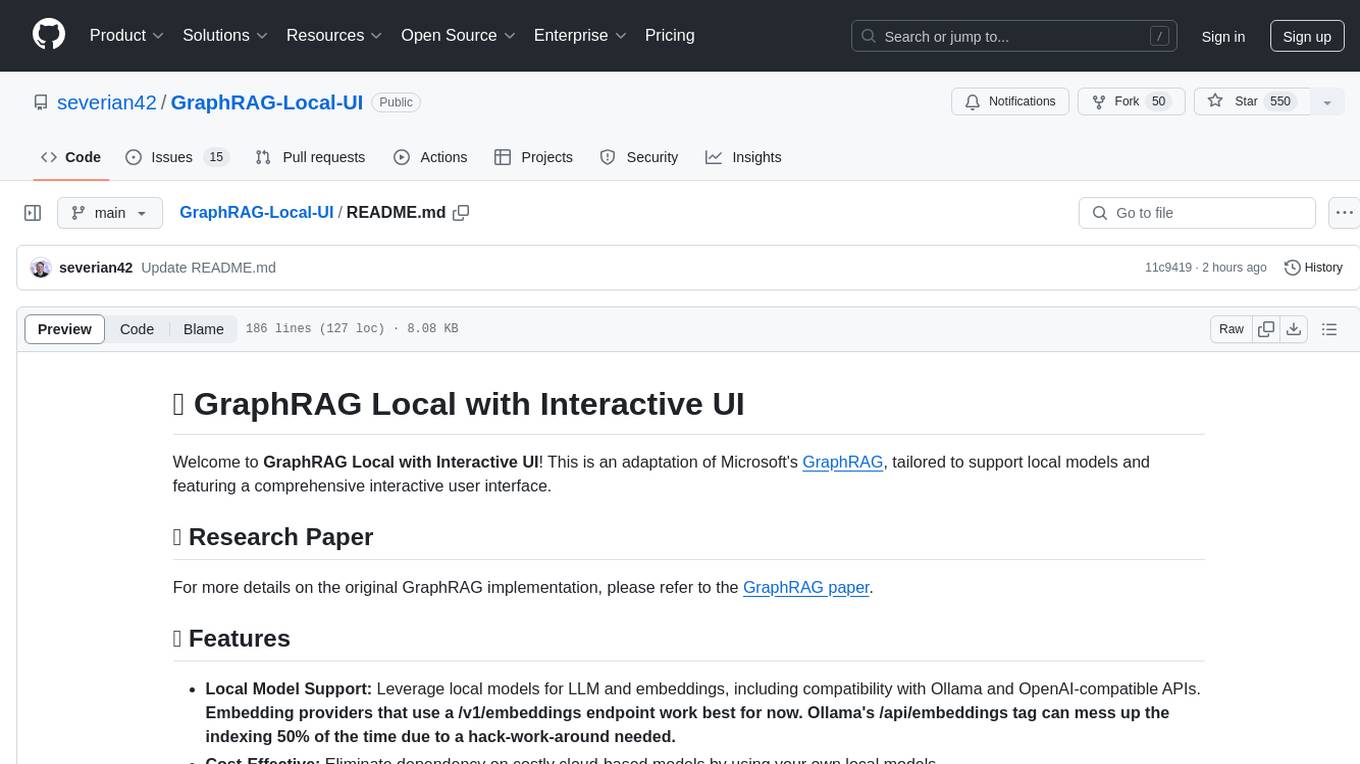
GraphRAG-Local-UI
GraphRAG Local with Interactive UI is an adaptation of Microsoft's GraphRAG, tailored to support local models and featuring a comprehensive interactive user interface. It allows users to leverage local models for LLM and embeddings, visualize knowledge graphs in 2D or 3D, manage files, settings, and queries, and explore indexing outputs. The tool aims to be cost-effective by eliminating dependency on costly cloud-based models and offers flexible querying options for global, local, and direct chat queries.
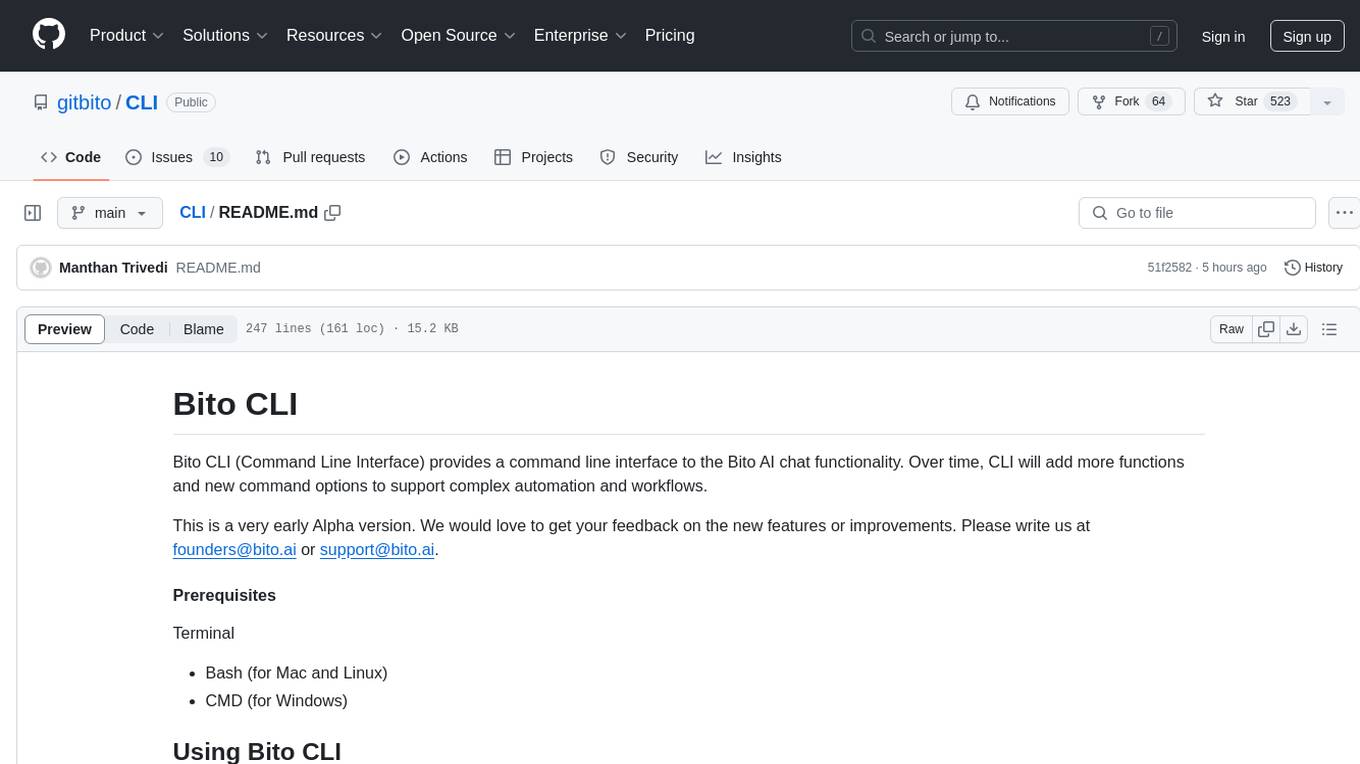
CLI
Bito CLI provides a command line interface to the Bito AI chat functionality, allowing users to interact with the AI through commands. It supports complex automation and workflows, with features like long prompts and slash commands. Users can install Bito CLI on Mac, Linux, and Windows systems using various methods. The tool also offers configuration options for AI model type, access key management, and output language customization. Bito CLI is designed to enhance user experience in querying AI models and automating tasks through the command line interface.
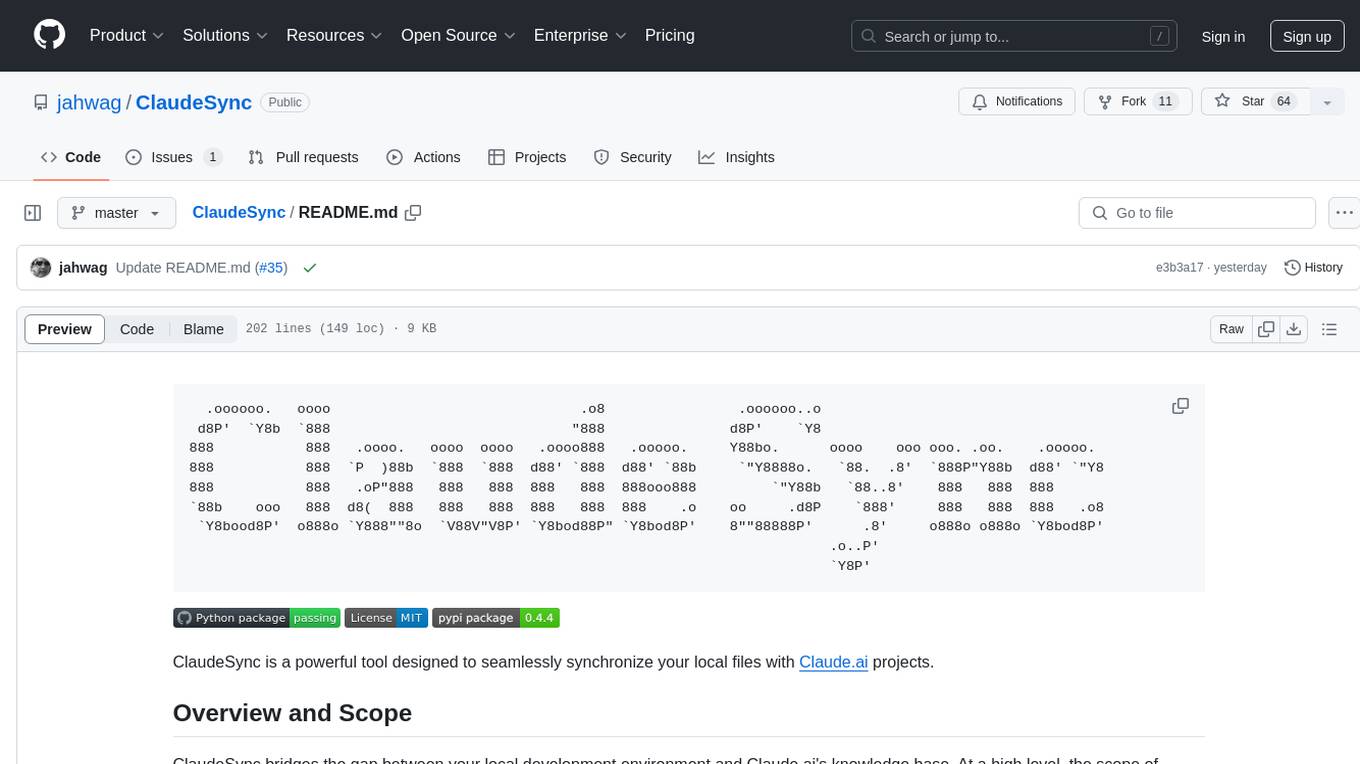
ClaudeSync
ClaudeSync is a powerful tool designed to seamlessly synchronize local files with Claude.ai projects. It bridges the gap between local development environment and Claude.ai's knowledge base, offering real-time synchronization, CLI for easy management, support for multiple organizations and projects, intelligent file filtering, configurable sync interval, two-way synchronization, and more. It ensures data privacy, open source transparency, and comes with disclaimers for use at own risk. Users can quickly start syncing by installing, logging in, selecting organization and project, and running sync. Advanced features include API, organization, project, file, chat management, configuration, synchronization modes, scheduled sync, providers, custom ignore file, and troubleshooting. Contributions are welcome, and communication channels include GitHub Issues and Discord. Licensed under MIT License.
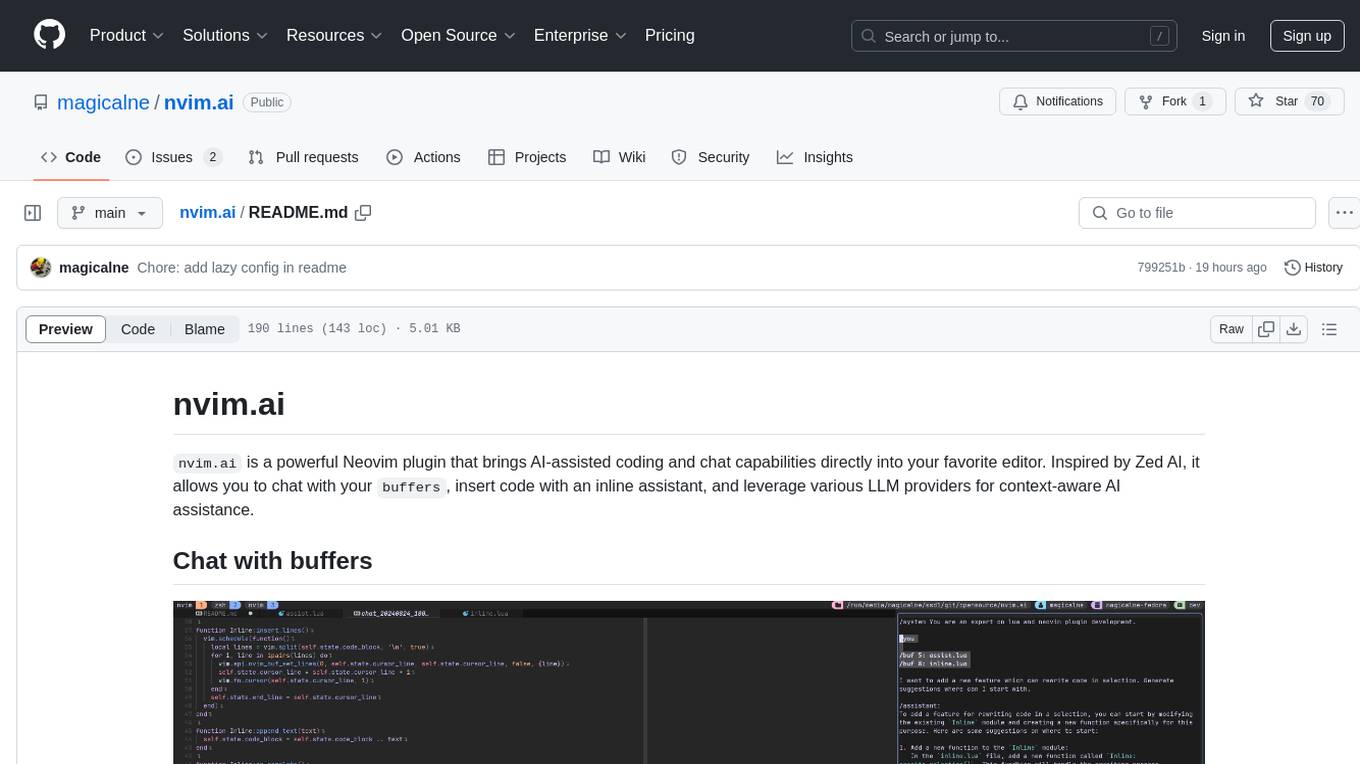
nvim.ai
nvim.ai is a powerful Neovim plugin that enables AI-assisted coding and chat capabilities within the editor. Users can chat with buffers, insert code with an inline assistant, and utilize various LLM providers for context-aware AI assistance. The plugin supports features like interacting with AI about code and documents, receiving relevant help based on current work, code insertion, code rewriting (Work in Progress), and integration with multiple LLM providers. Users can configure the plugin, add API keys to dotfiles, and integrate with nvim-cmp for command autocompletion. Keymaps are available for chat and inline assist functionalities. The chat dialog allows parsing content with keywords and supports roles like /system, /you, and /assistant. Context-aware assistance can be accessed through inline assist by inserting code blocks anywhere in the file.
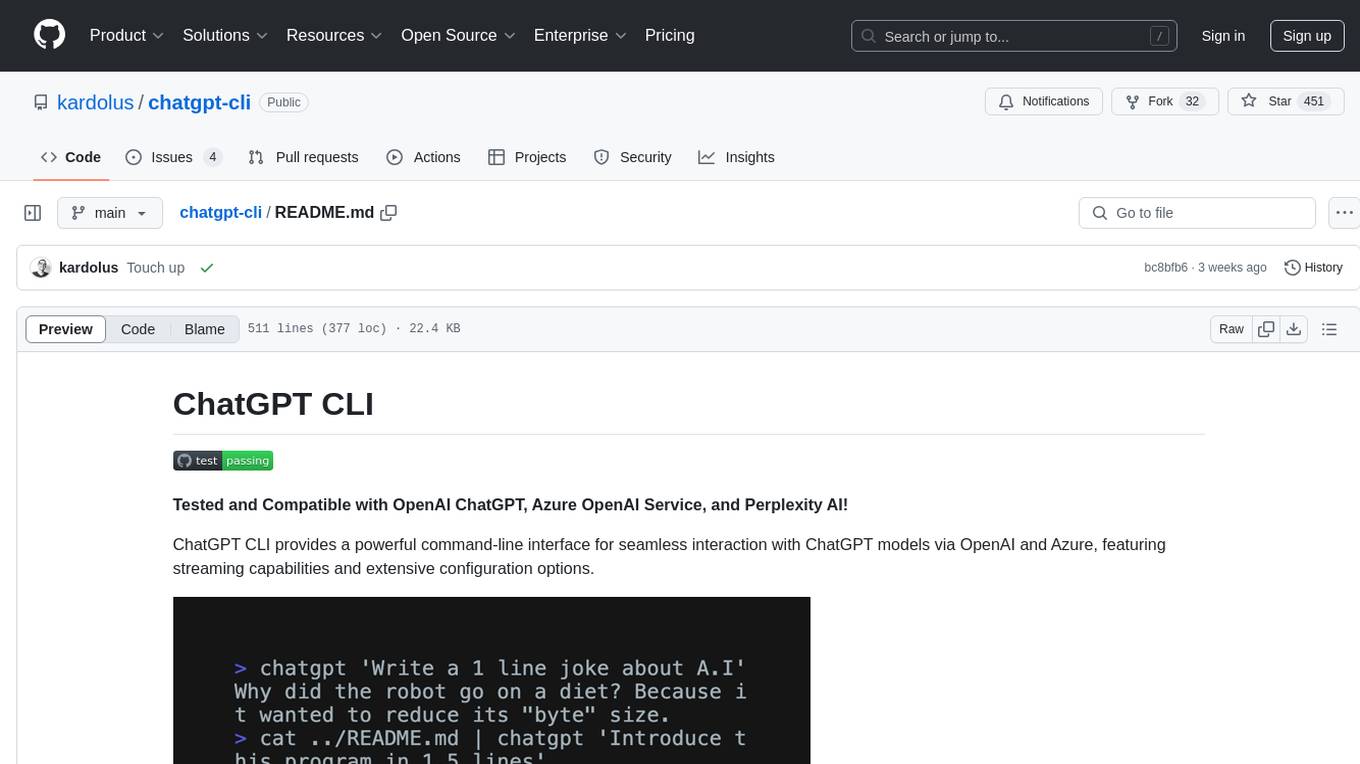
chatgpt-cli
ChatGPT CLI provides a powerful command-line interface for seamless interaction with ChatGPT models via OpenAI and Azure. It features streaming capabilities, extensive configuration options, and supports various modes like streaming, query, and interactive mode. Users can manage thread-based context, sliding window history, and provide custom context from any source. The CLI also offers model and thread listing, advanced configuration options, and supports GPT-4, GPT-3.5-turbo, and Perplexity's models. Installation is available via Homebrew or direct download, and users can configure settings through default values, a config.yaml file, or environment variables.
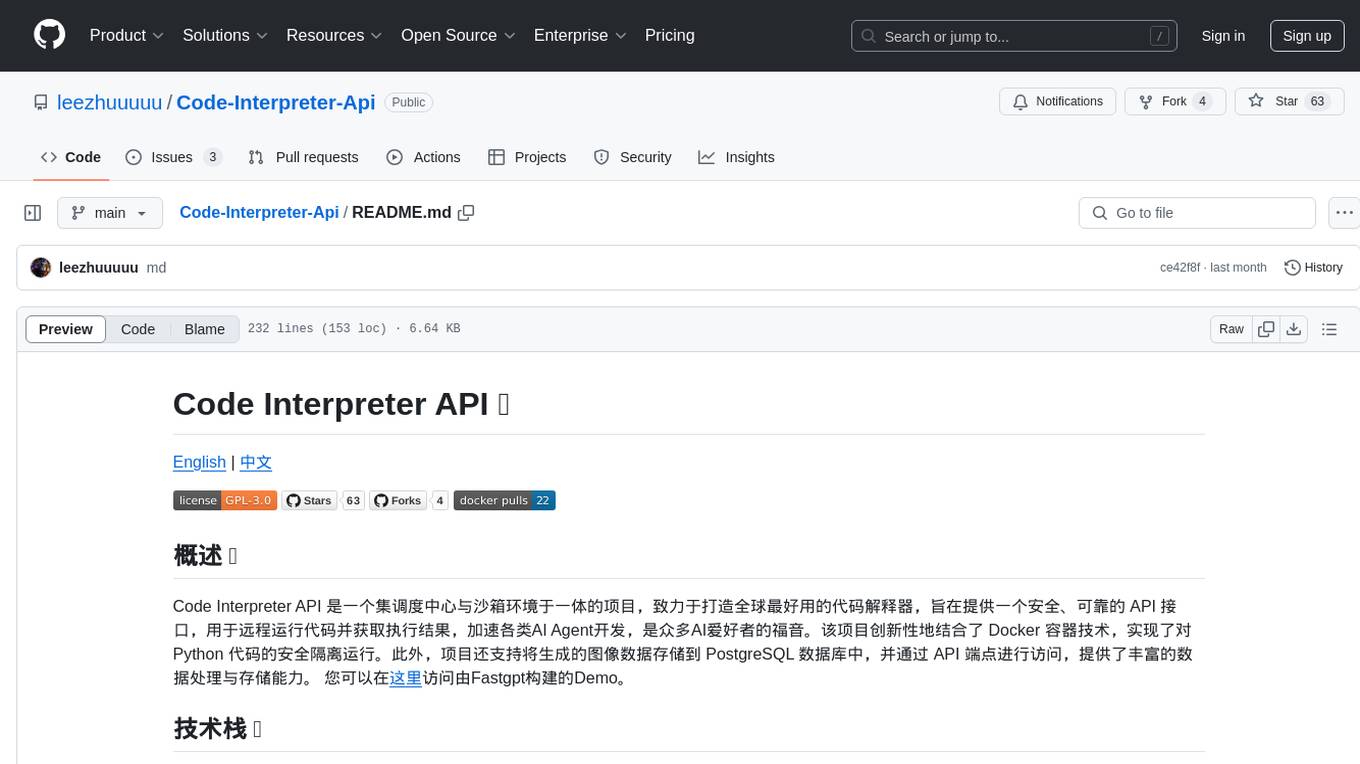
Code-Interpreter-Api
Code Interpreter API is a project that combines a scheduling center with a sandbox environment, dedicated to creating the world's best code interpreter. It aims to provide a secure, reliable API interface for remotely running code and obtaining execution results, accelerating the development of various AI agents, and being a boon to many AI enthusiasts. The project innovatively combines Docker container technology to achieve secure isolation and execution of Python code. Additionally, the project supports storing generated image data in a PostgreSQL database and accessing it through API endpoints, providing rich data processing and storage capabilities.
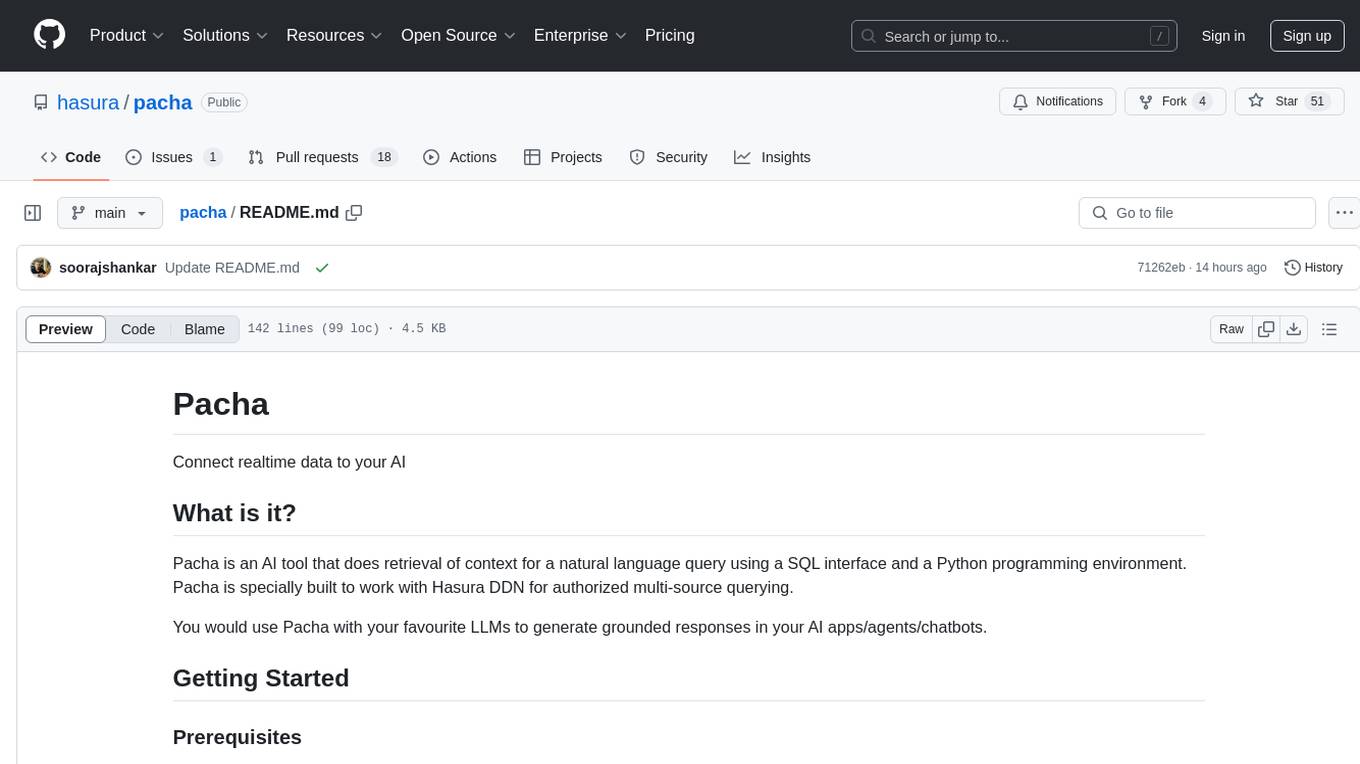
pacha
Pacha is an AI tool designed for retrieving context for natural language queries using a SQL interface and Python programming environment. It is optimized for working with Hasura DDN for multi-source querying. Pacha is used in conjunction with language models to produce informed responses in AI applications, agents, and chatbots.
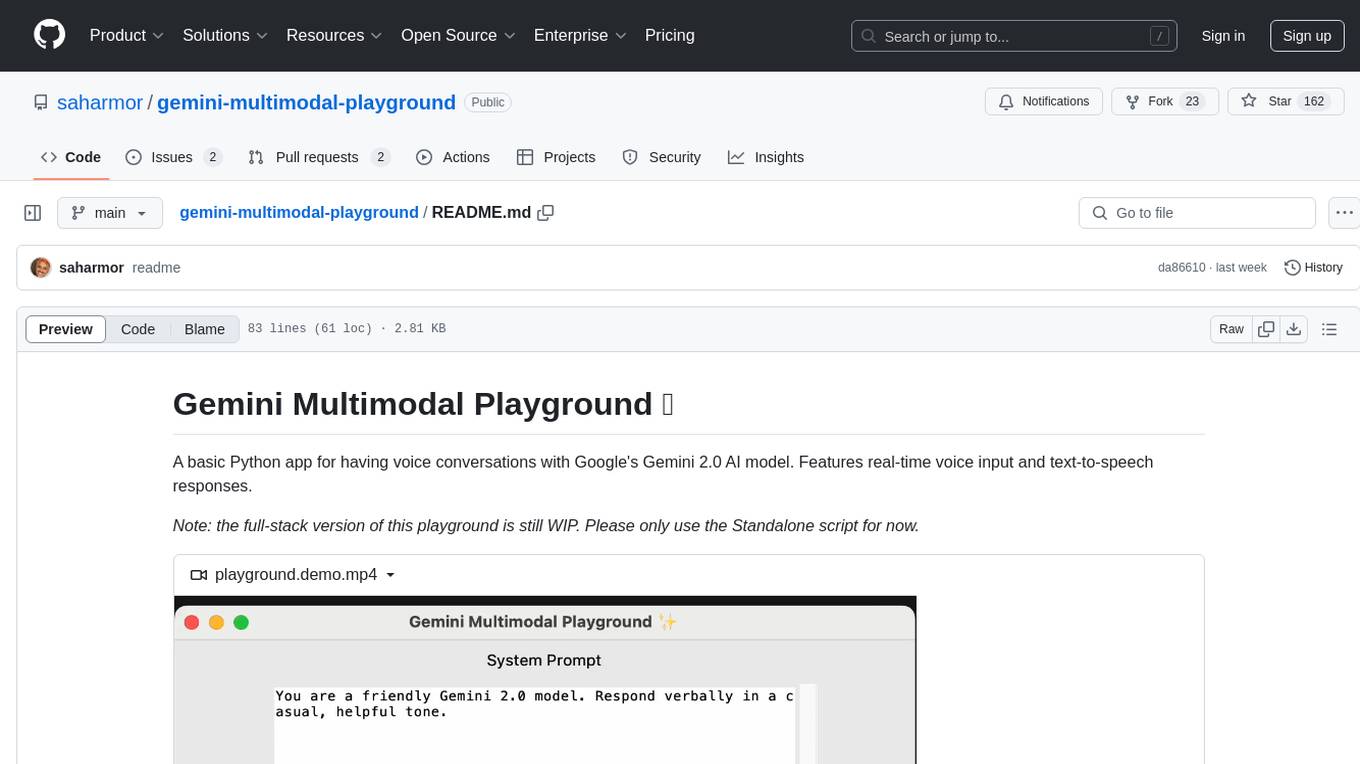
gemini-multimodal-playground
Gemini Multimodal Playground is a basic Python app for voice conversations with Google's Gemini 2.0 AI model. It features real-time voice input and text-to-speech responses. Users can configure settings through the GUI and interact with Gemini by speaking into the microphone. The application provides options for voice selection, system prompt customization, and enabling Google search. Troubleshooting tips are available for handling audio feedback loop issues that may occur during interactions.
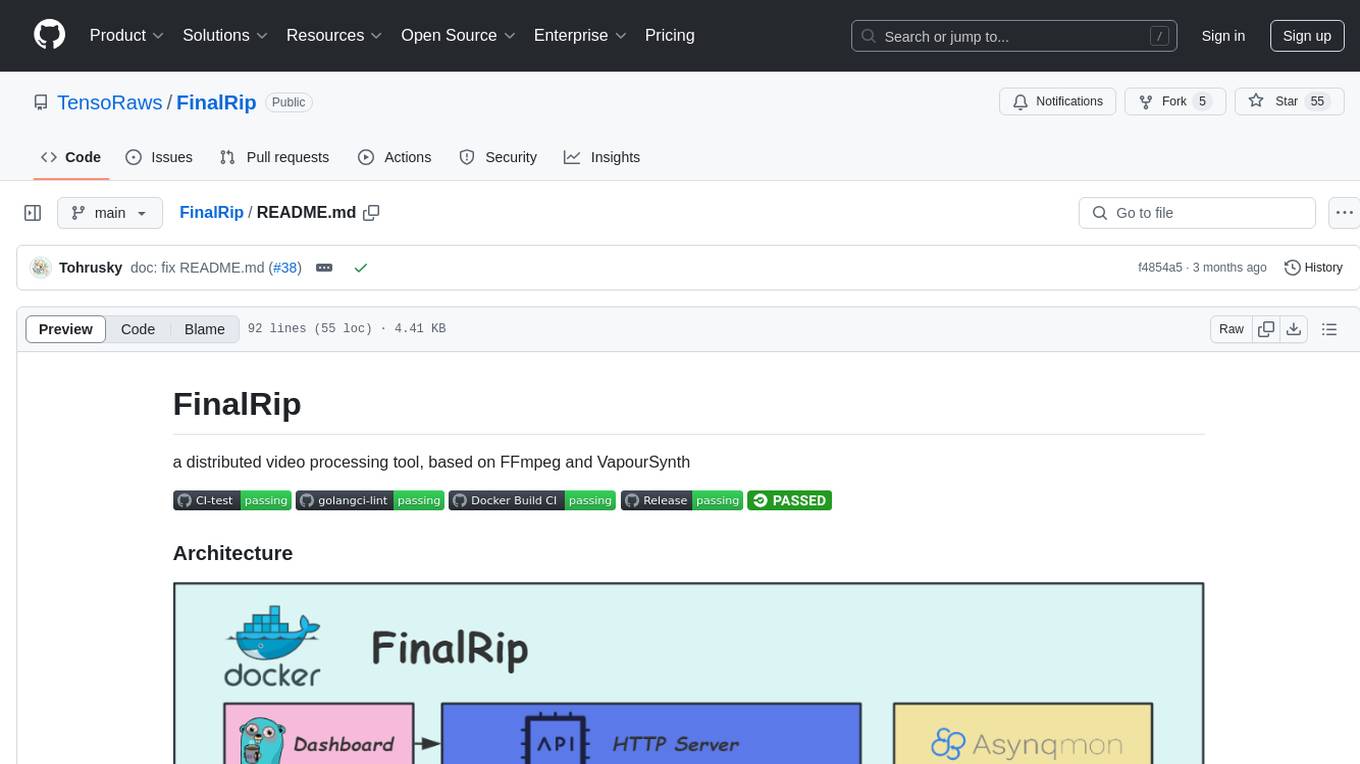
FinalRip
FinalRip is a distributed video processing tool based on FFmpeg and VapourSynth. It cuts the original video into multiple clips, processes each clip in parallel, and merges them into the final video. Users can deploy the system in a distributed way, configure settings via environment variables or remote config files, and develop/test scripts in the vs-playground environment. It supports Nvidia GPU, AMD GPU with ROCm support, and provides a dashboard for selecting compatible scripts to process videos.

TestSpark
TestSpark is a plugin for generating unit tests that integrates AI-based test generation tools. It supports LLM-based test generation using OpenAI, HuggingFace, and JetBrains internal AI Assistant platform, as well as local search-based test generation using EvoSuite. Users can configure test generation settings, interact with test cases, view coverage statistics, and integrate tests into projects. The plugin is designed for experimental use to augment existing test suites, not replace manual test writing.
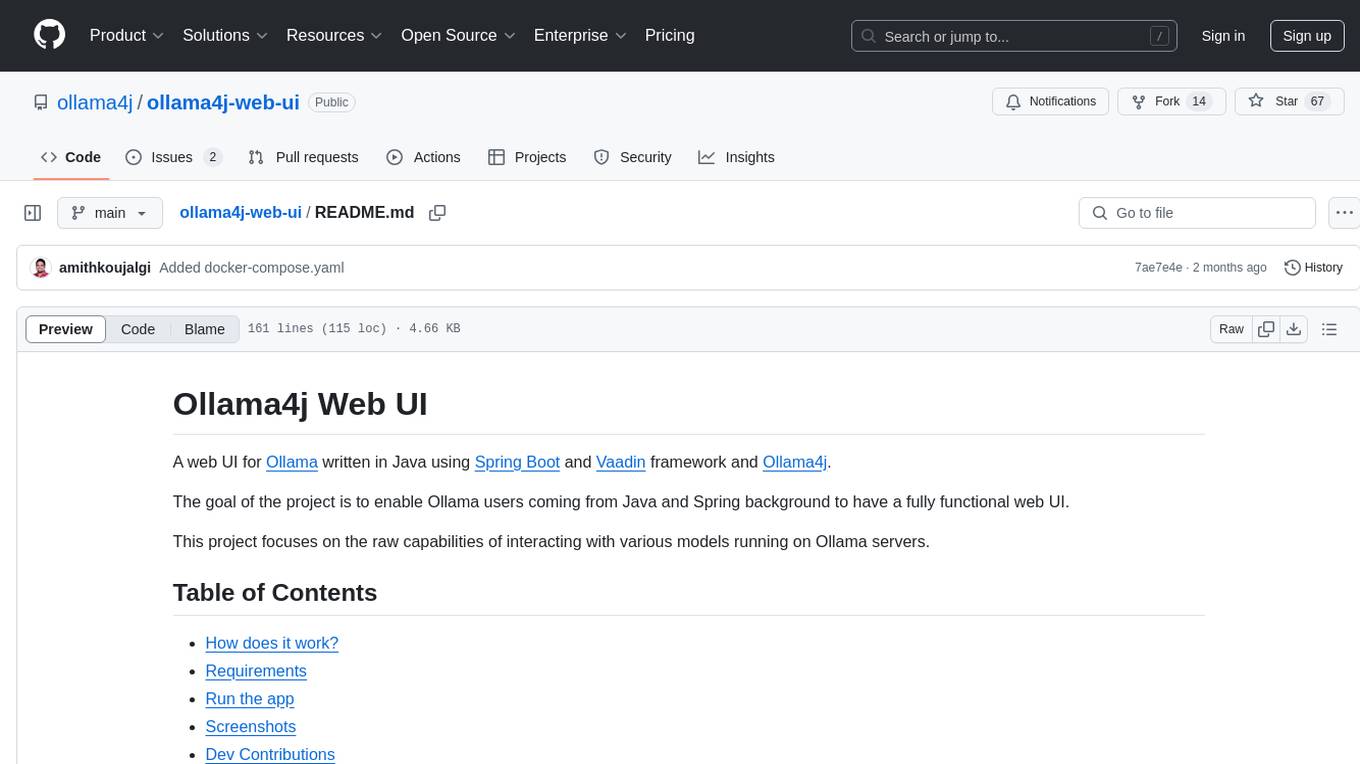
ollama4j-web-ui
Ollama4j Web UI is a Java-based web interface built using Spring Boot and Vaadin framework for Ollama users with Java and Spring background. It allows users to interact with various models running on Ollama servers, providing a fully functional web UI experience. The project offers multiple ways to run the application, including via Docker, Docker Compose, or as a standalone JAR. Users can configure the environment variables and access the web UI through a browser. The project also includes features for error handling on the UI and settings pane for customizing default parameters.
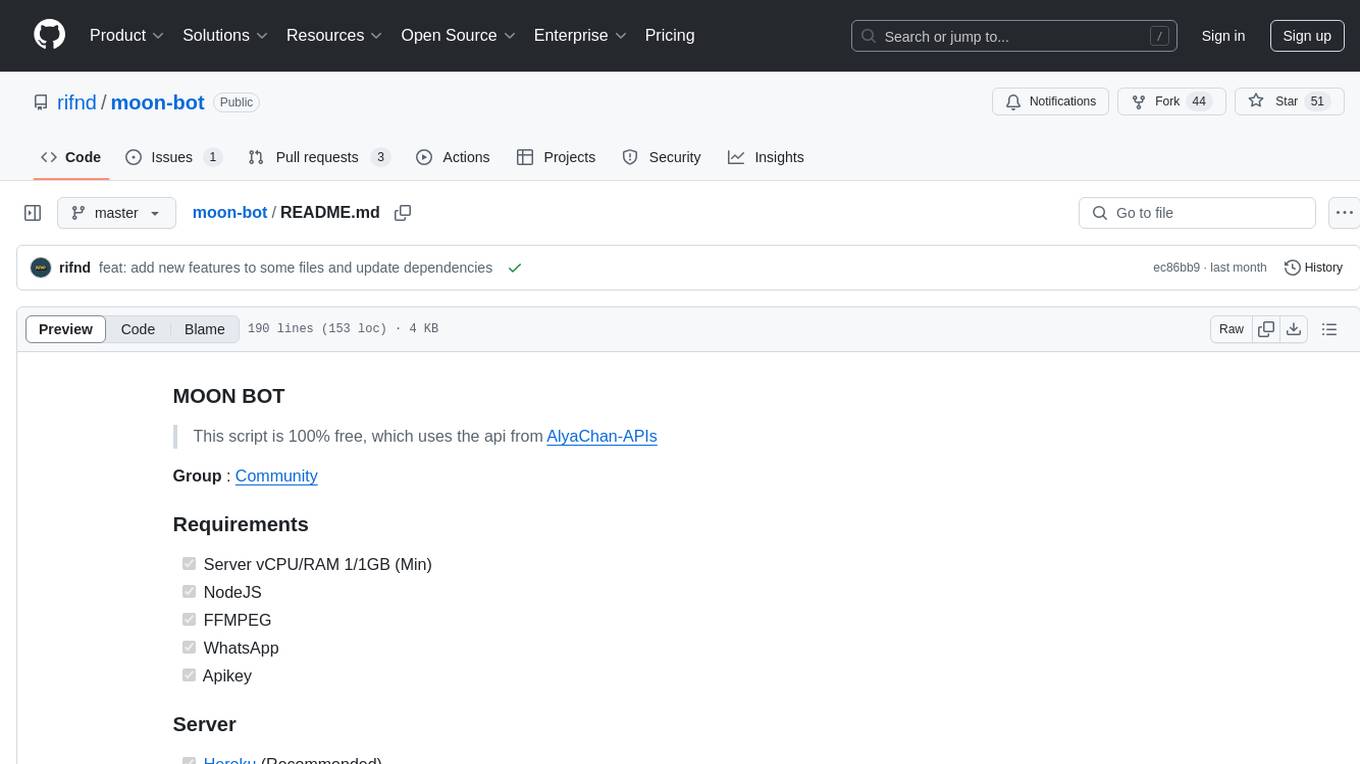
moon-bot
Moon Bot is a free script that utilizes the AlyaChan-APIs. It requires a server with specific specifications, NodeJS, FFMPEG, WhatsApp, and an API key. The script can be deployed on platforms like Heroku, VPS/RDP DigitalOcean, VPS NAT HostData, and Panel Optiklink. It supports databases like MongoDB, PostgreSQL Supabase, and PostgreSQL/MongoDB Railway for testing. Users can configure the script through .env, config.json, and config.js files. Installation and running instructions are provided for different environments. The script supports plugins and events, and external session management is possible. Moon Bot is under development and receives regular updates.
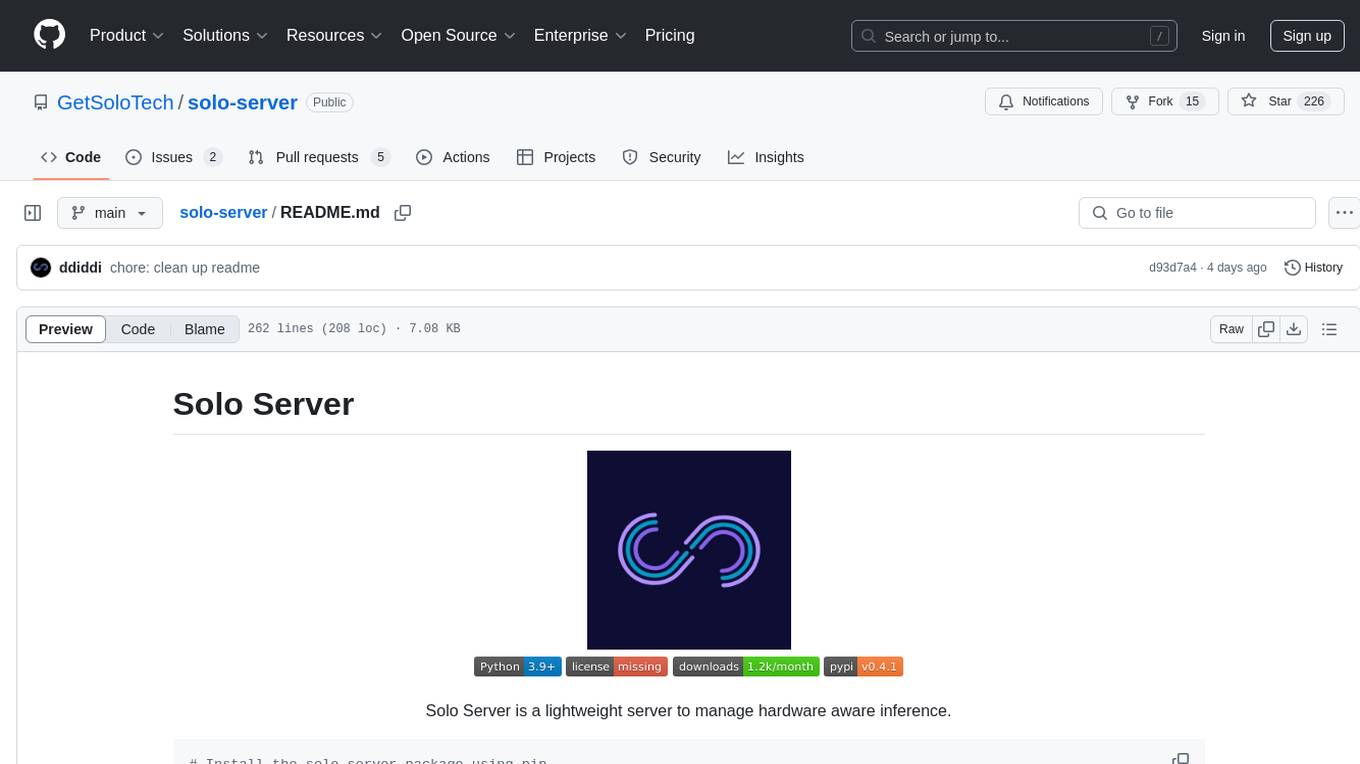
solo-server
Solo Server is a lightweight server designed for managing hardware-aware inference. It provides seamless setup through a simple CLI and HTTP servers, an open model registry for pulling models from platforms like Ollama and Hugging Face, cross-platform compatibility for effortless deployment of AI models on hardware, and a configurable framework that auto-detects hardware components (CPU, GPU, RAM) and sets optimal configurations.
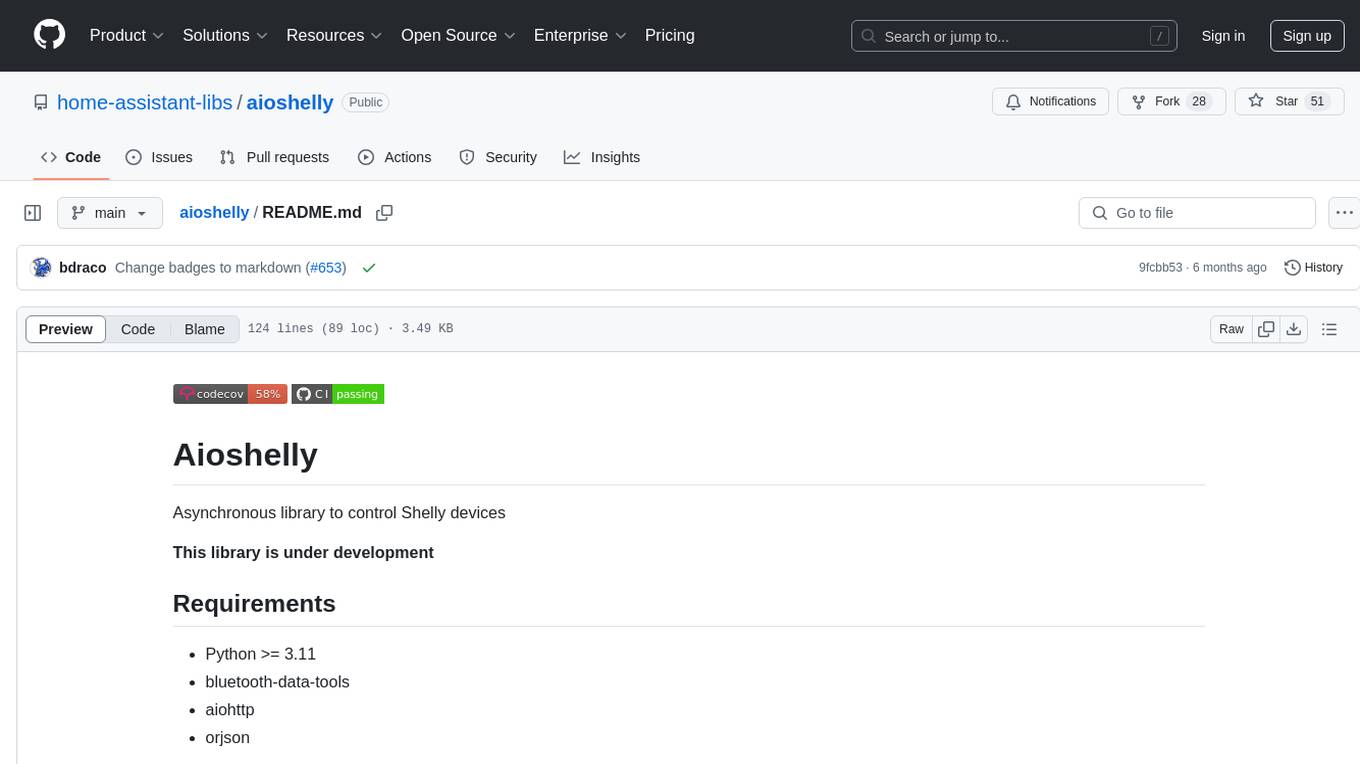
aioshelly
Aioshelly is an asynchronous library designed to control Shelly devices. It is currently under development and requires Python version 3.11 or higher, along with dependencies like bluetooth-data-tools, aiohttp, and orjson. The library provides examples for interacting with Gen1 devices using CoAP protocol and Gen2/Gen3 devices using RPC and WebSocket protocols. Users can easily connect to Shelly devices, retrieve status information, and perform various actions through the provided APIs. The repository also includes example scripts for quick testing and usage guidelines for contributors to maintain consistency with the Shelly API.
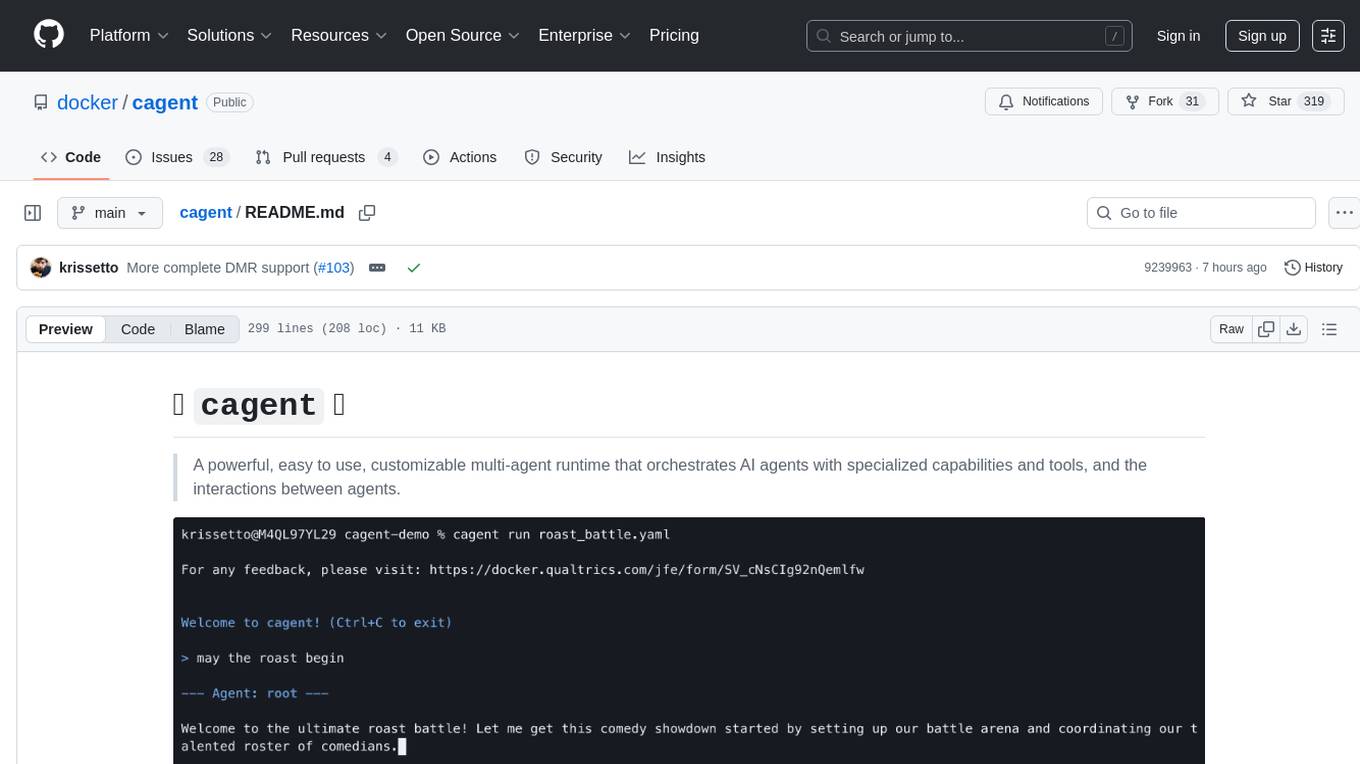
cagent
cagent is a powerful and easy-to-use multi-agent runtime that orchestrates AI agents with specialized capabilities and tools, allowing users to quickly build, share, and run a team of virtual experts to solve complex problems. It supports creating agents with YAML configuration, improving agents with MCP servers, and delegating tasks to specialists. Key features include multi-agent architecture, rich tool ecosystem, smart delegation, YAML configuration, advanced reasoning tools, and support for multiple AI providers like OpenAI, Anthropic, Gemini, and Docker Model Runner.
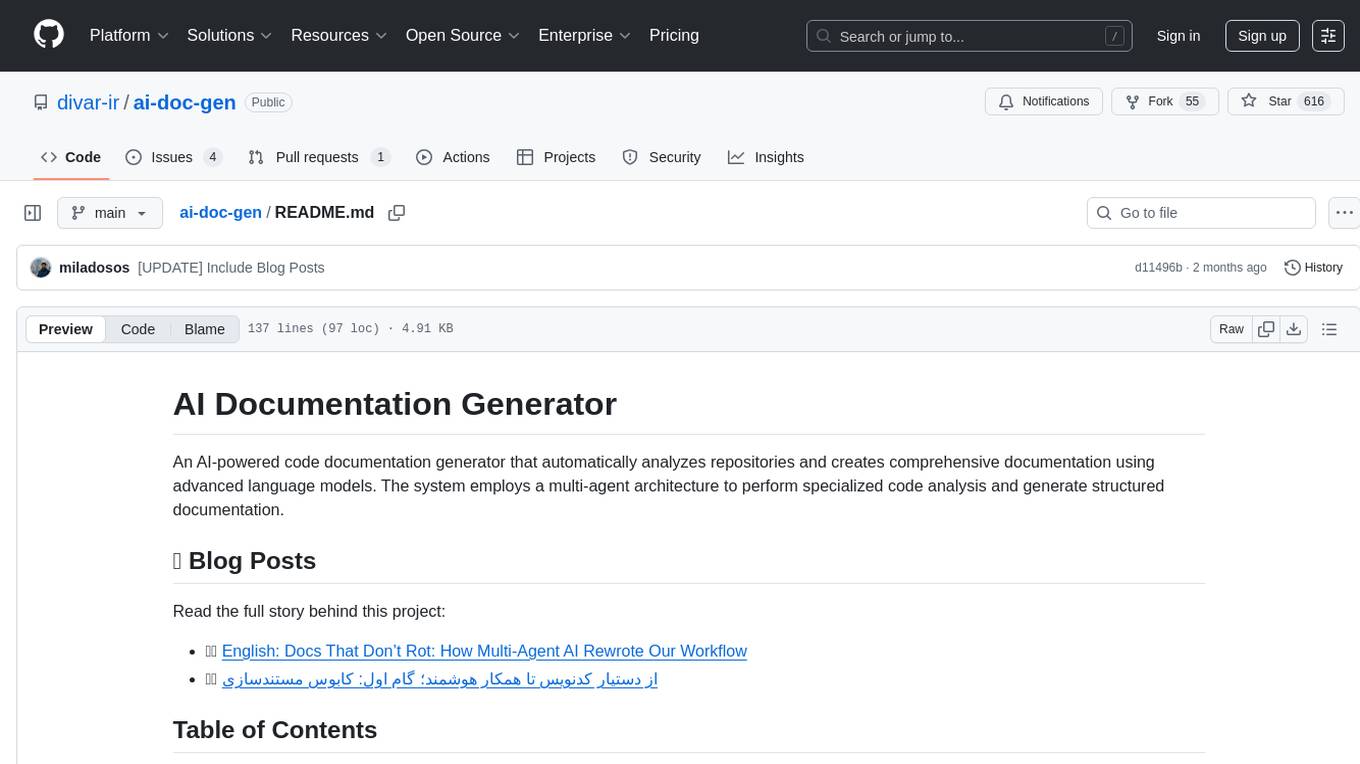
ai-doc-gen
An AI-powered code documentation generator that automatically analyzes repositories and creates comprehensive documentation using advanced language models. The system employs a multi-agent architecture to perform specialized code analysis and generate structured documentation.
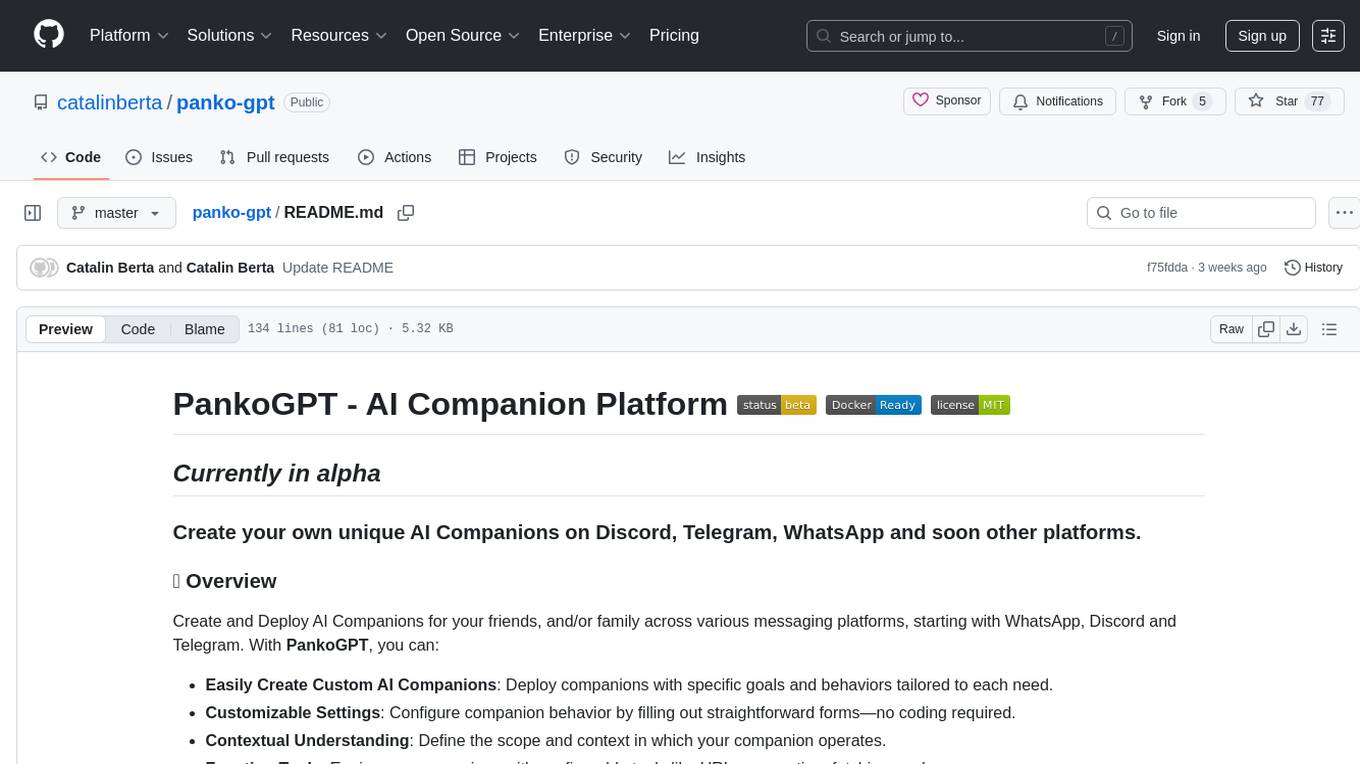
panko-gpt
PankoGPT is an AI companion platform that allows users to easily create and deploy custom AI companions on messaging platforms like WhatsApp, Discord, and Telegram. Users can customize companion behavior, configure settings, and equip companions with various tools without the need for coding. The platform aims to provide contextual understanding and user-friendly interface for creating companions that respond based on context and offer configurable tools for enhanced capabilities. Planned features include expanded functionality, pre-built skills, and optimization for better performance.
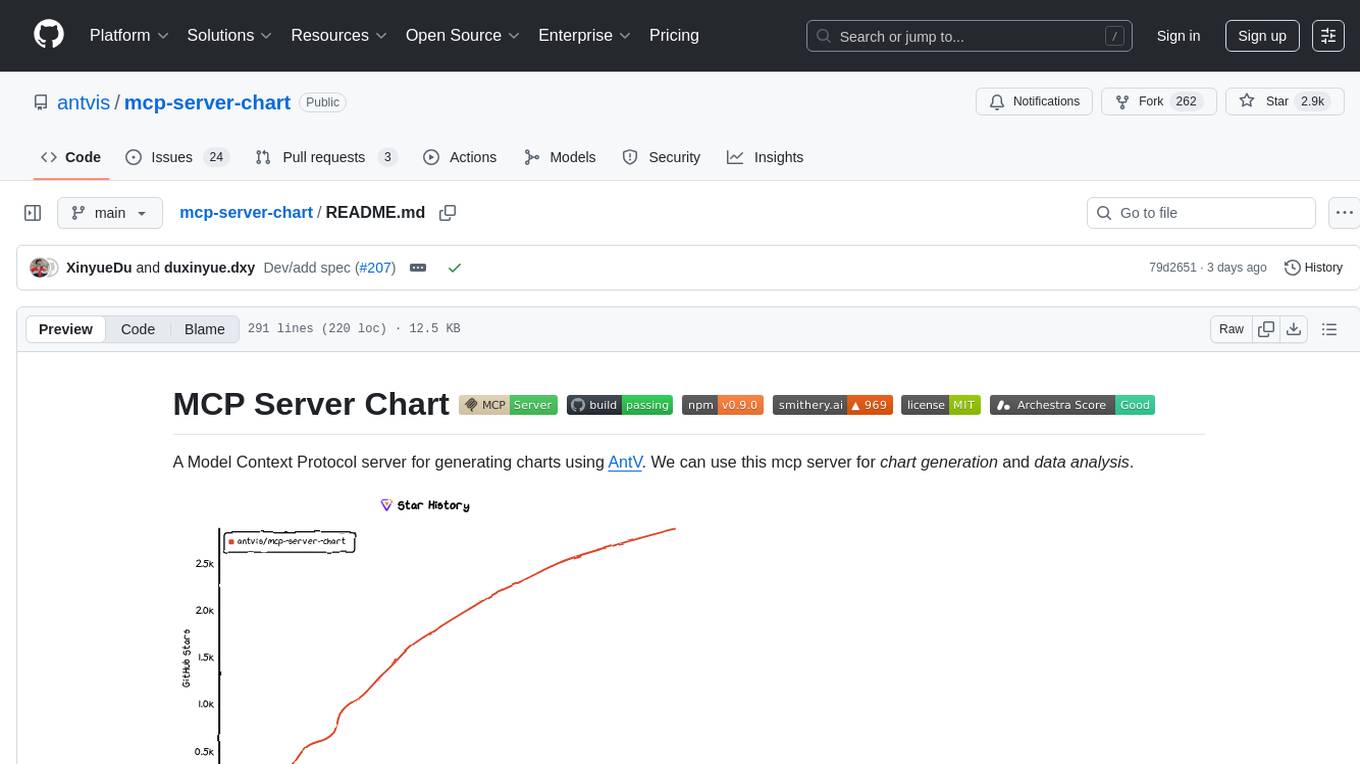
mcp-server-chart
mcp-server-chart is a Helm chart for deploying a Minecraft server on Kubernetes. It simplifies the process of setting up and managing a Minecraft server in a Kubernetes environment. The chart includes configurations for specifying server settings, resource limits, and persistent storage options. With mcp-server-chart, users can easily deploy and scale Minecraft servers on Kubernetes clusters, ensuring high availability and performance for multiplayer gaming experiences.
20 - OpenAI Gpts

Assistant Windows
Expert en Windows, réponses précises en français. Créé par Tutos-Informatique.
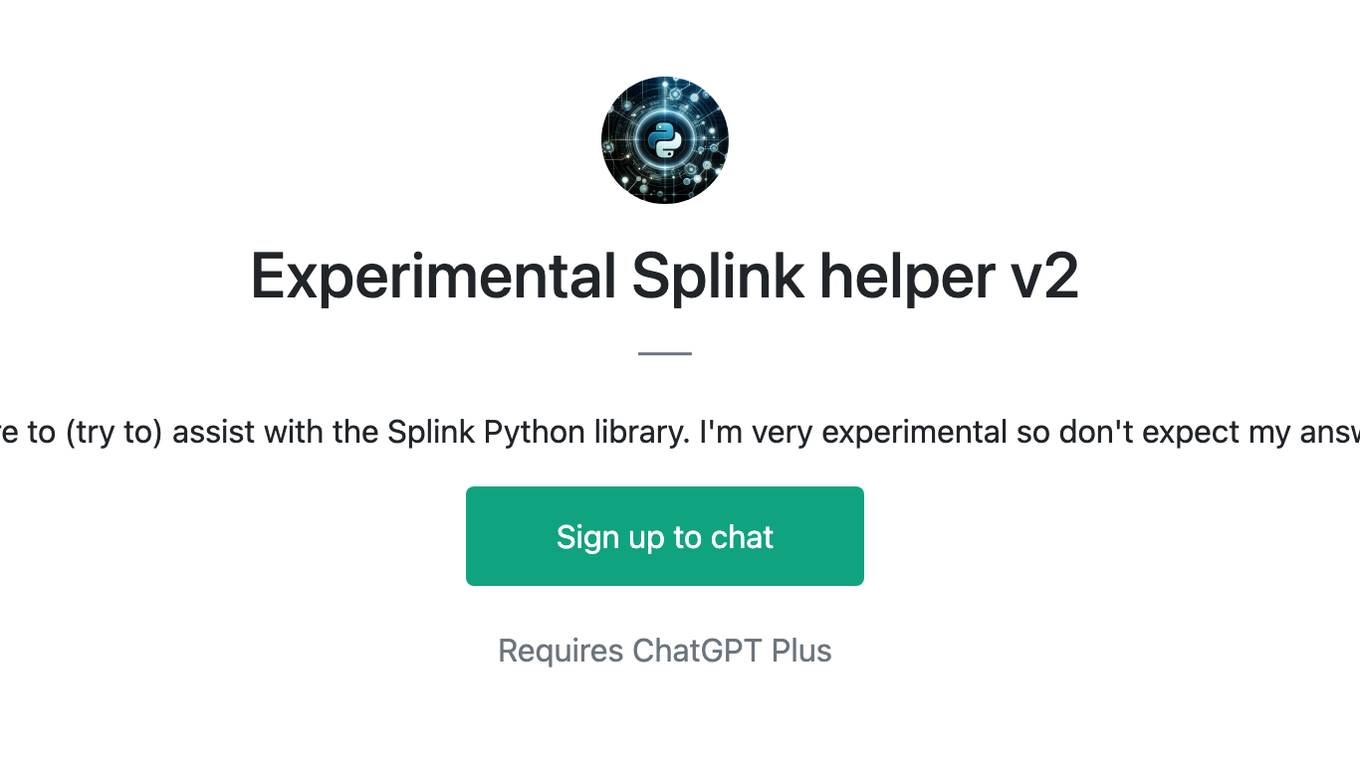
Experimental Splink helper v2
I'm Splink Helper, here to (try to) assist with the Splink Python library. I'm very experimental so don't expect my answers to be accurate
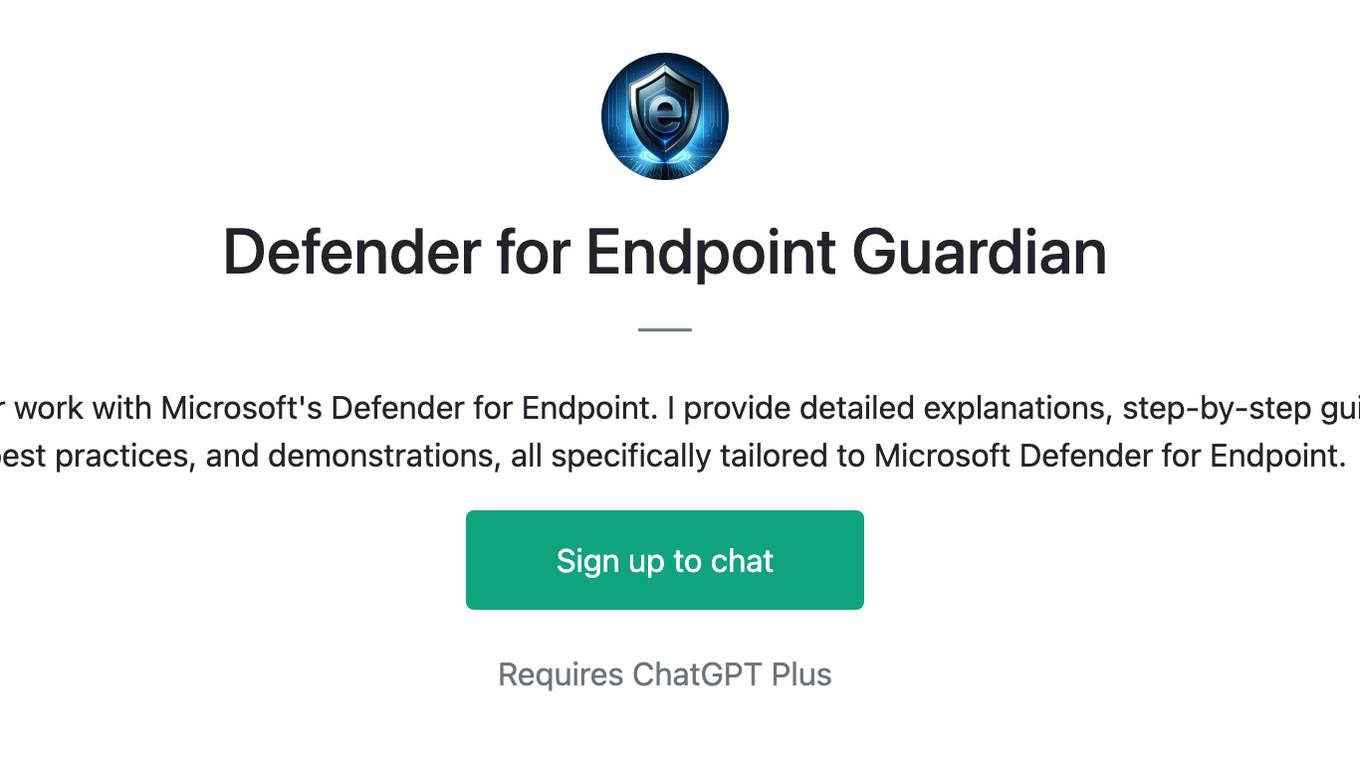
Defender for Endpoint Guardian
To assist individuals seeking to learn about or work with Microsoft's Defender for Endpoint. I provide detailed explanations, step-by-step guides, troubleshooting advice, cybersecurity best practices, and demonstrations, all specifically tailored to Microsoft Defender for Endpoint.
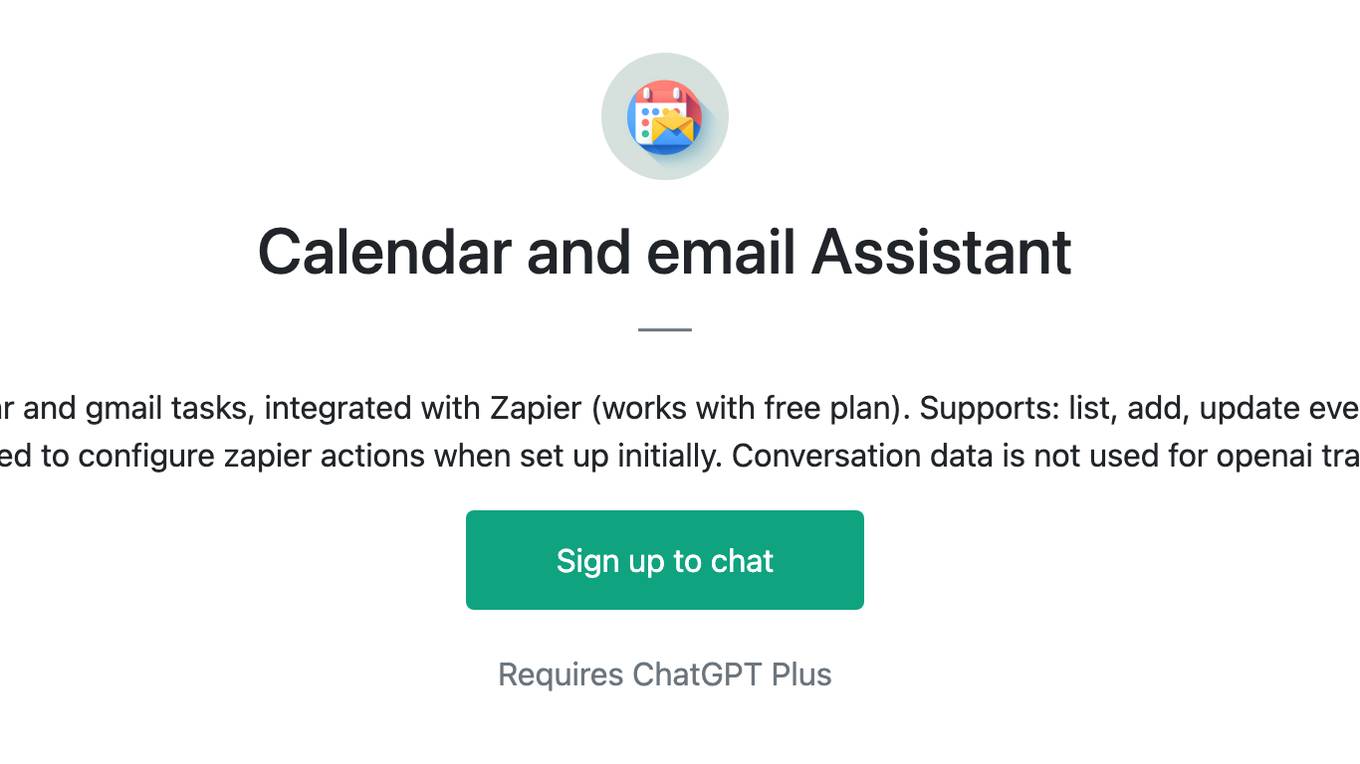
Calendar and email Assistant
Your expert assistant for Google Calendar and gmail tasks, integrated with Zapier (works with free plan). Supports: list, add, update events to calendar, send gmail. You will be prompted to configure zapier actions when set up initially. Conversation data is not used for openai training.

Salesforce Sidekick
Personal assistant for Salesforce configuration, coding, troubleshooting, solutioning, proposal writing, and more. This is not an official Salesforce product or service.

Istio Advisor Plus
Rich in Istio knowledge, with a focus on configurations, troubleshooting, and bug reporting.

FlashSystem Expert
Expert on IBM FlashSystem, offering 'How-To' guidance and technical insights.
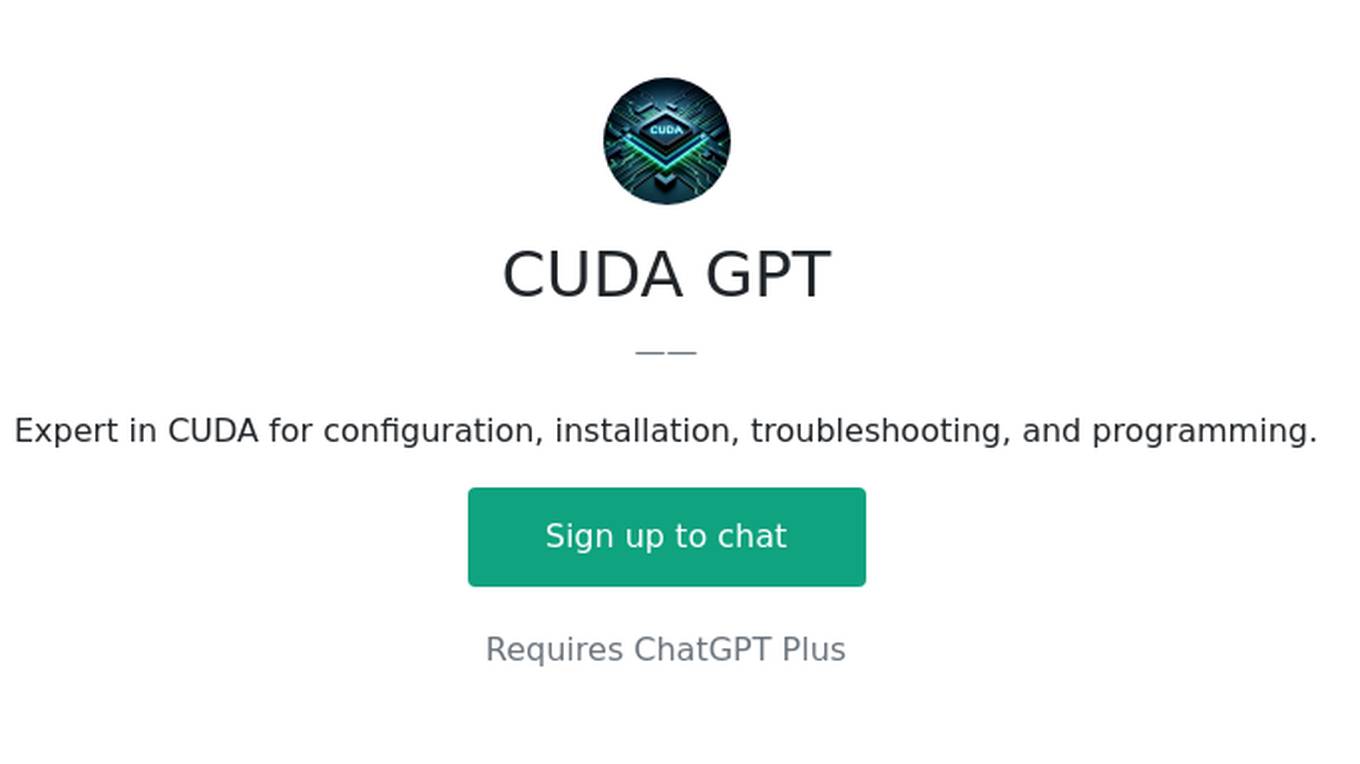
CUDA GPT
Expert in CUDA for configuration, installation, troubleshooting, and programming.
SIP Expert
A senior VoIP engineer with expertise in SIP, RTP, IMS, and WebRTC. Kinda employed at sipfront.com, your telco test automation company.
